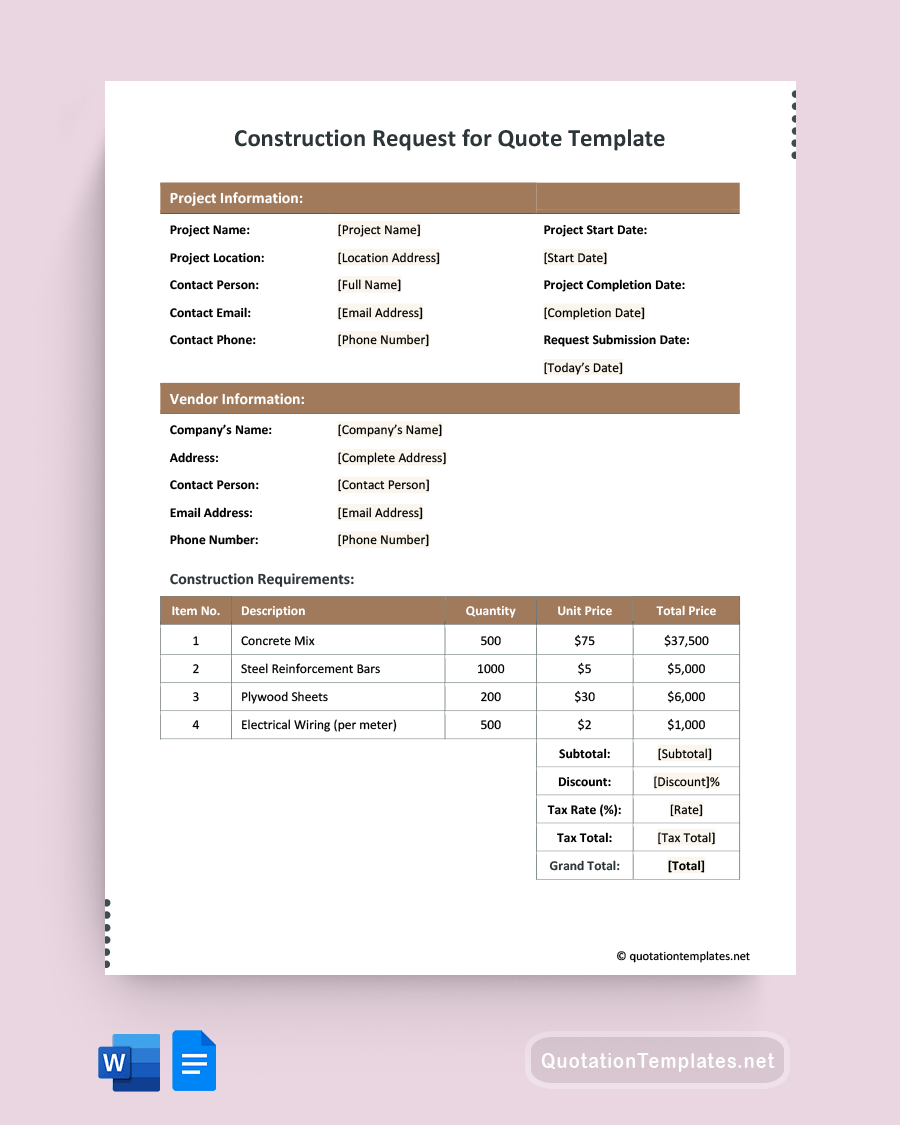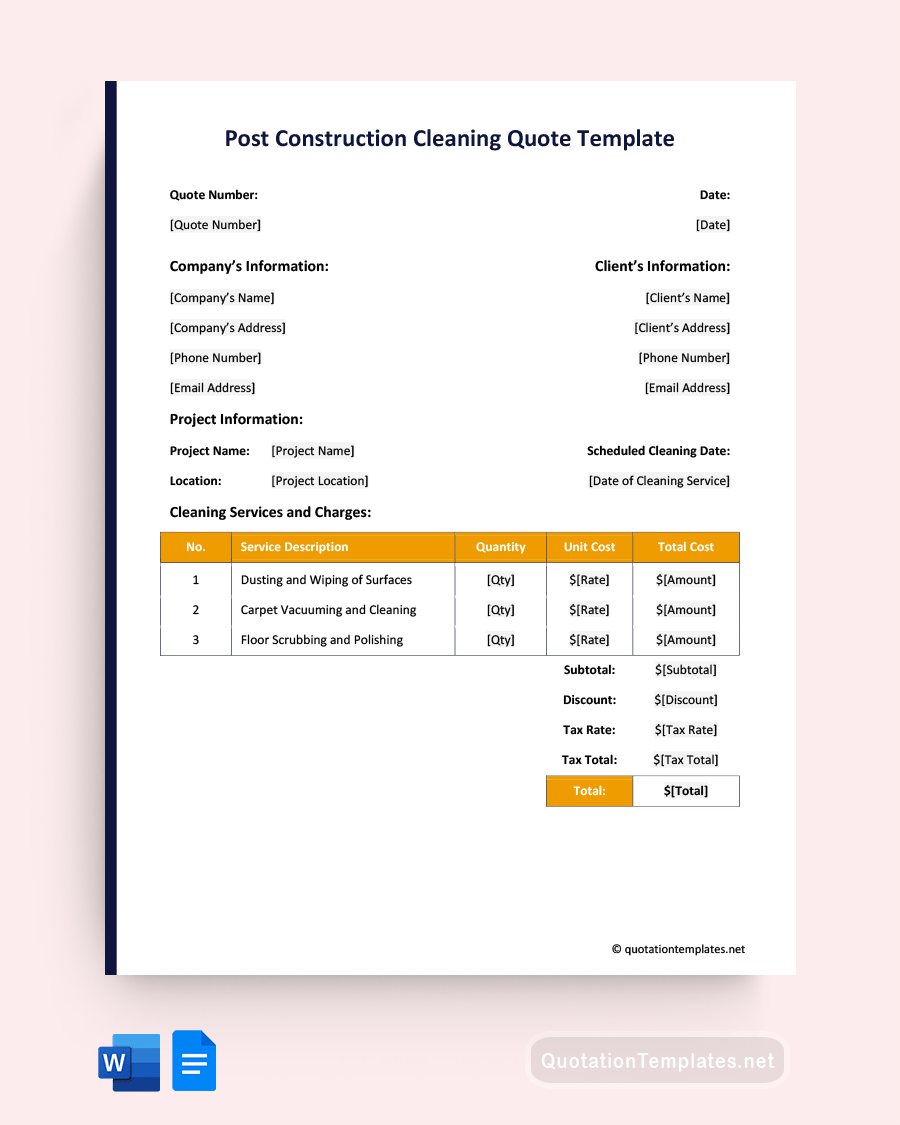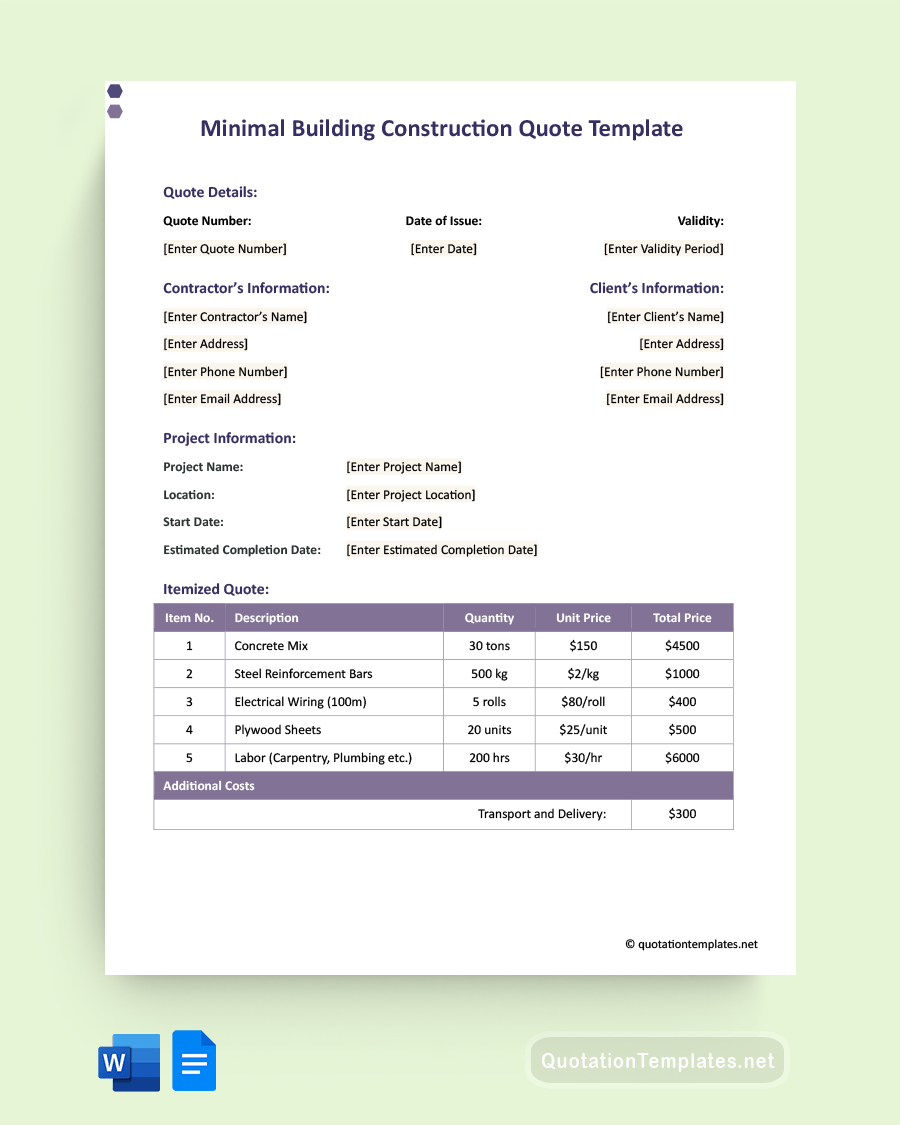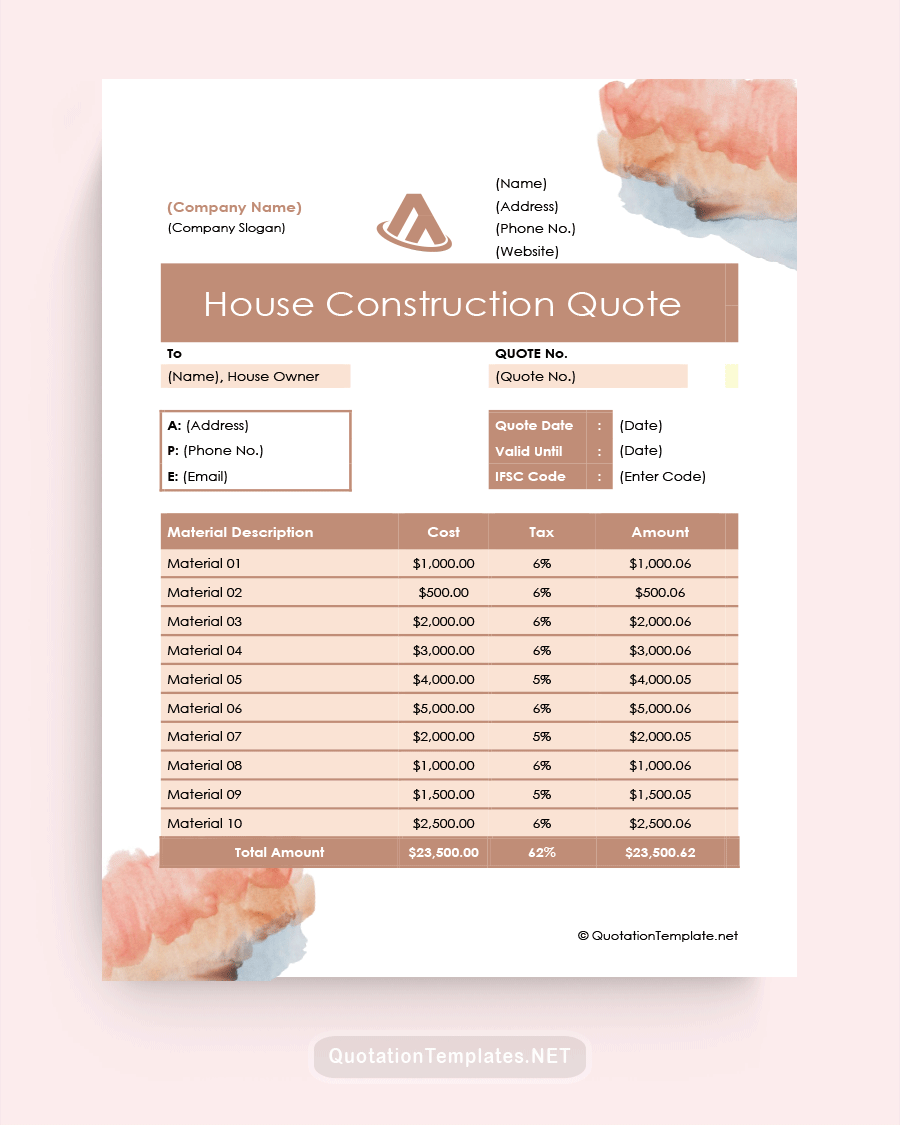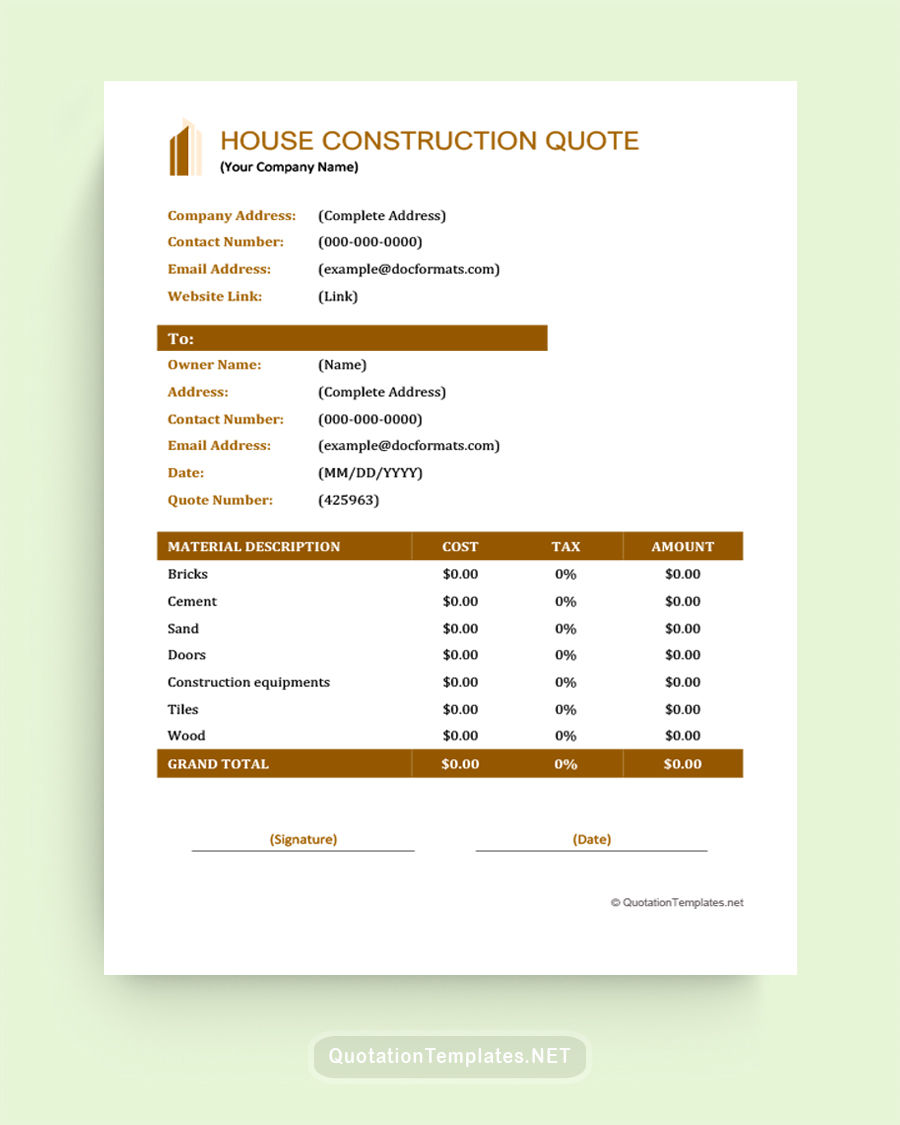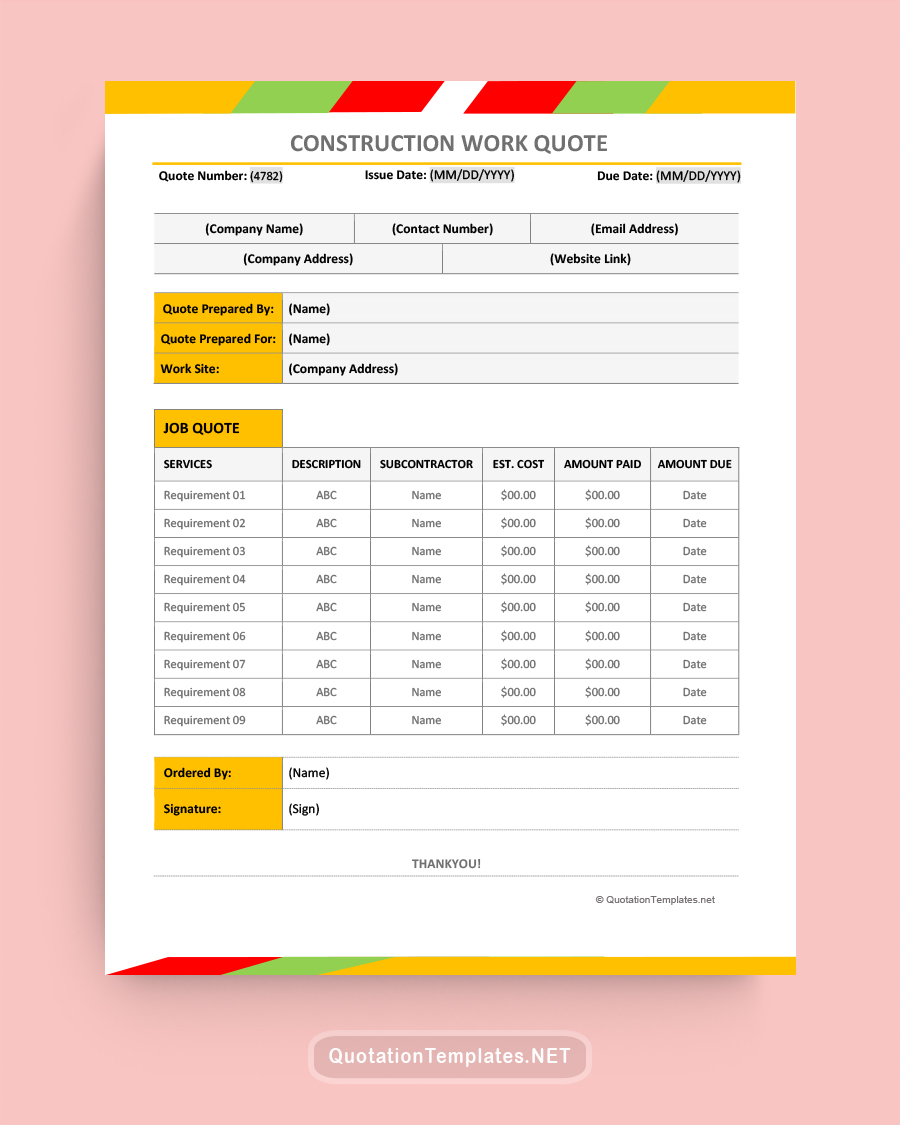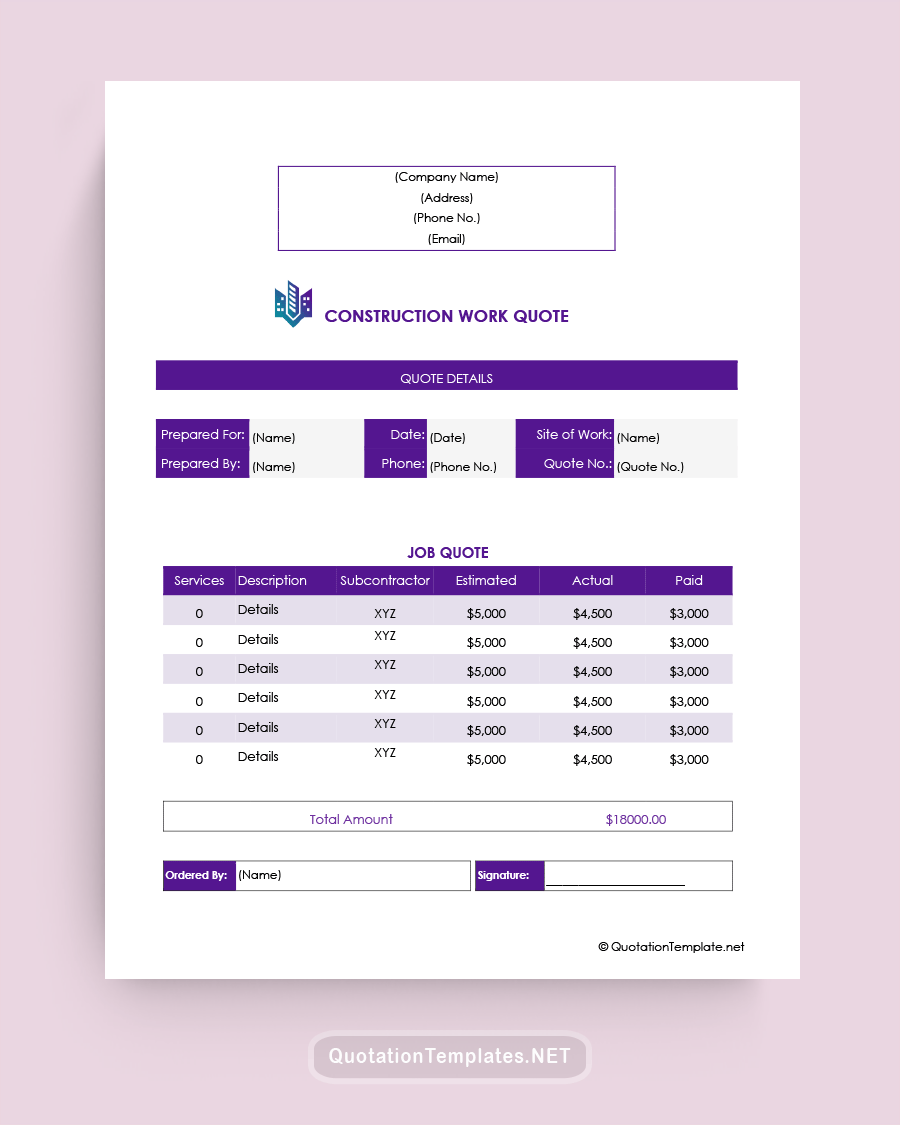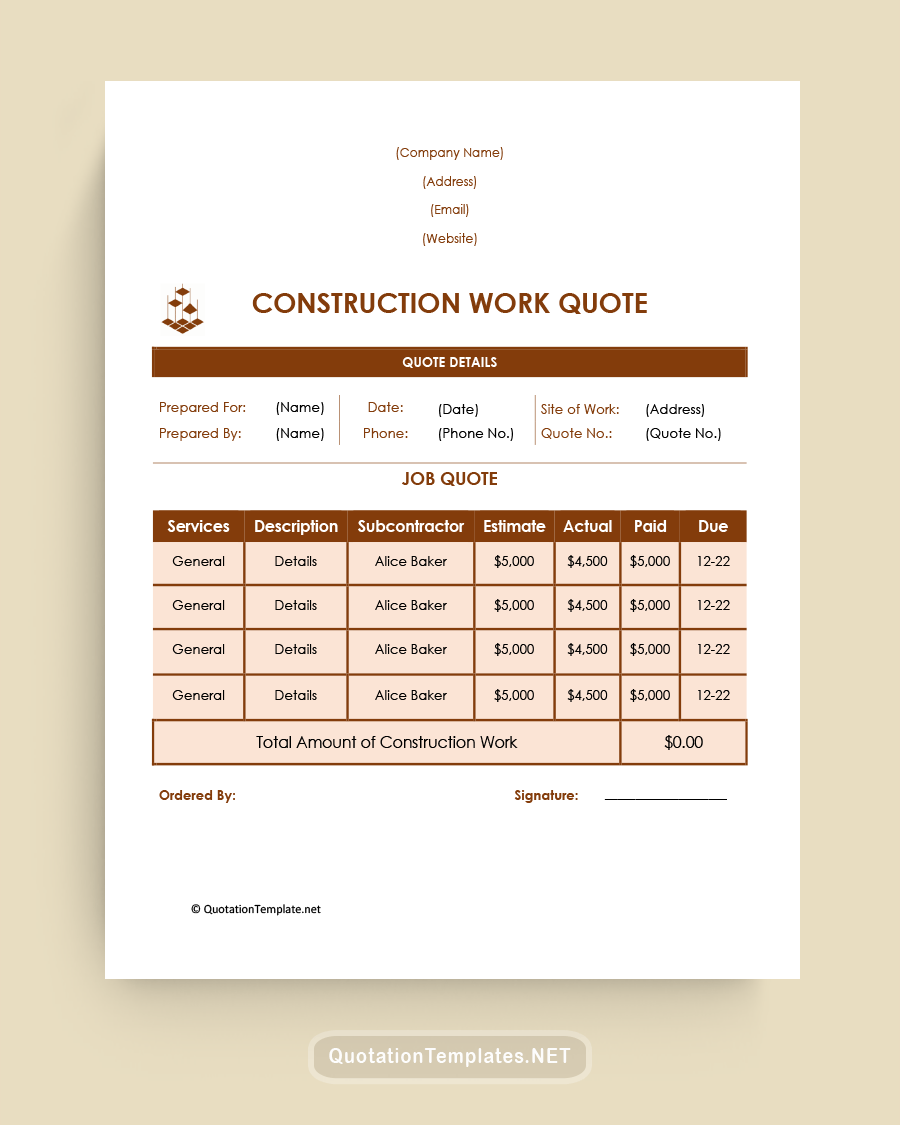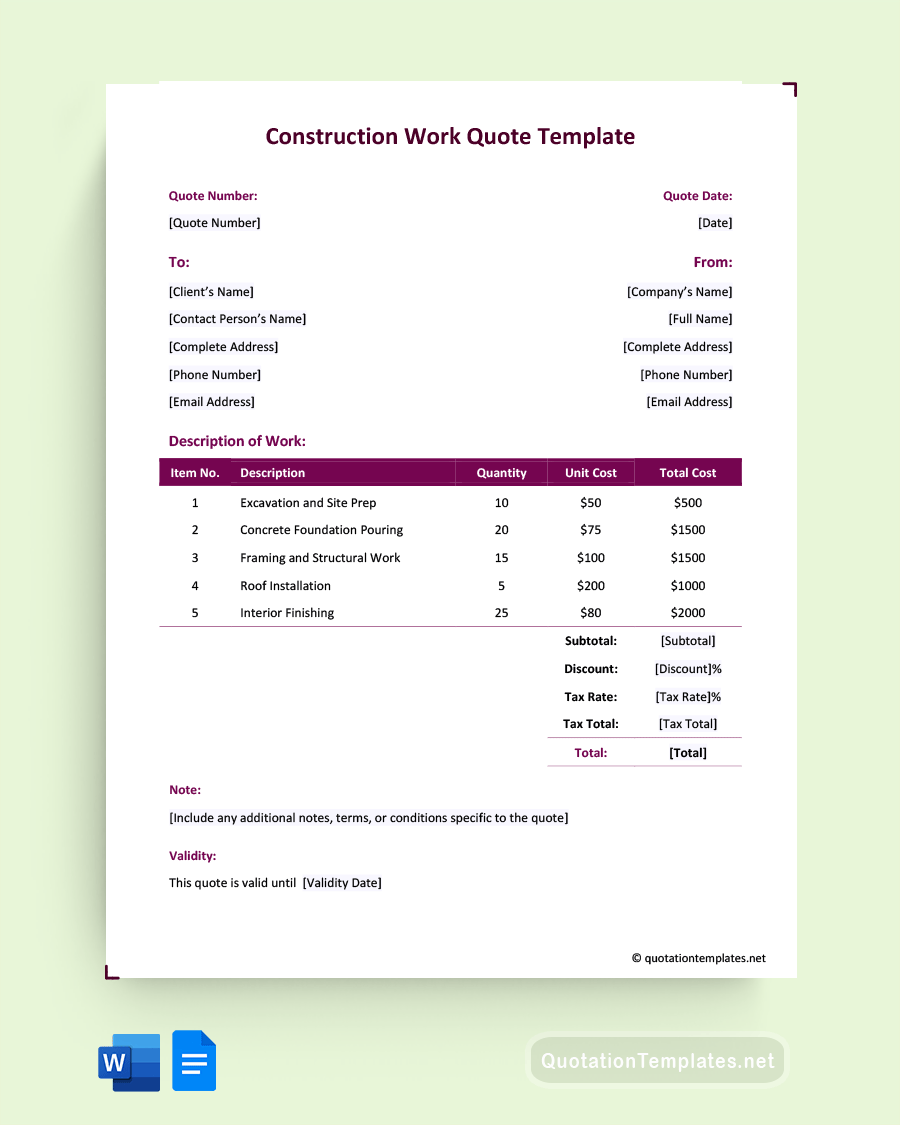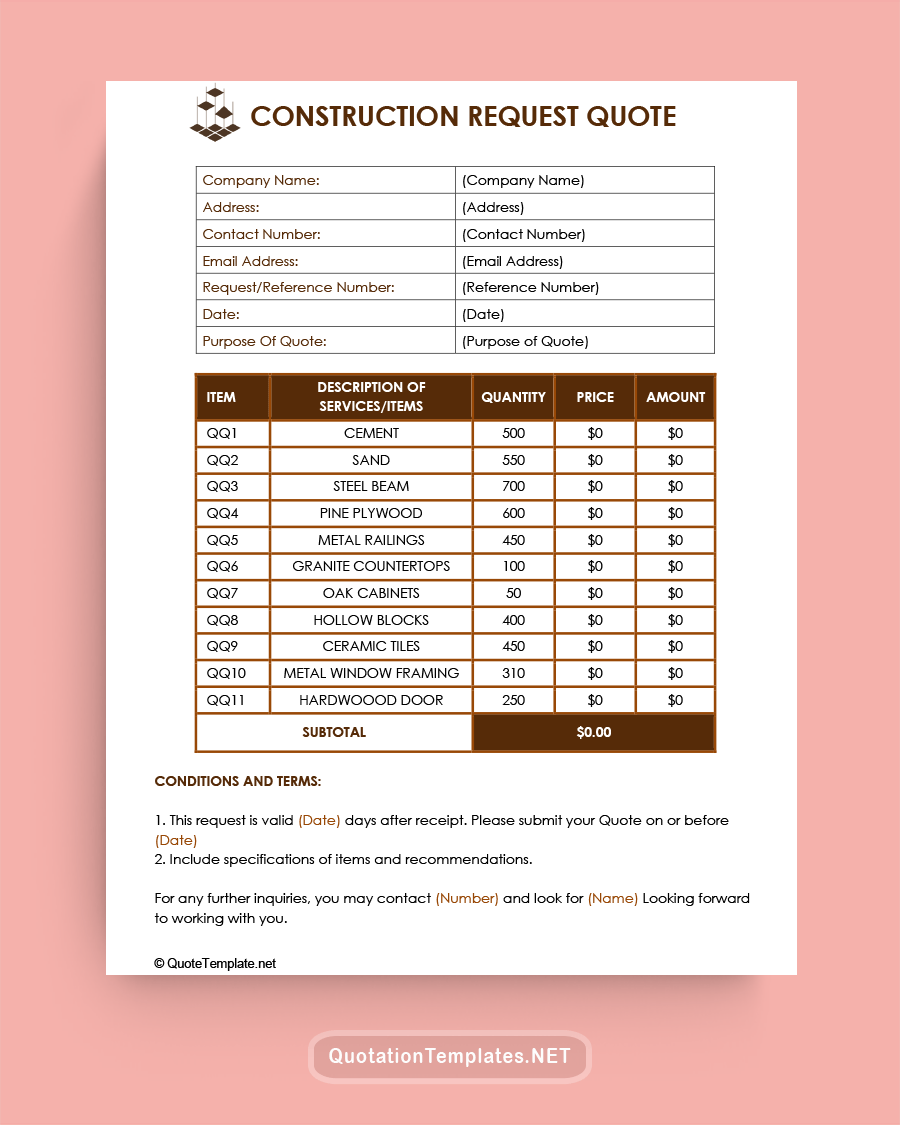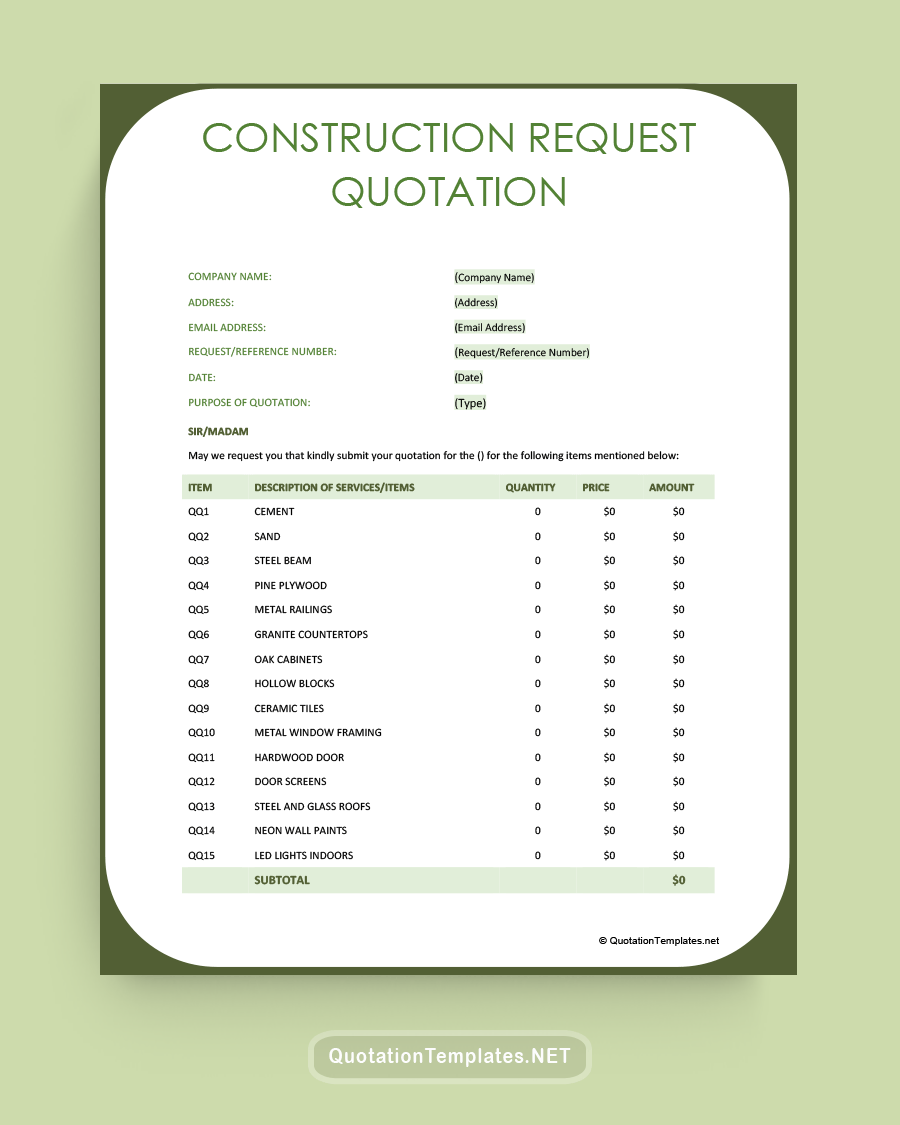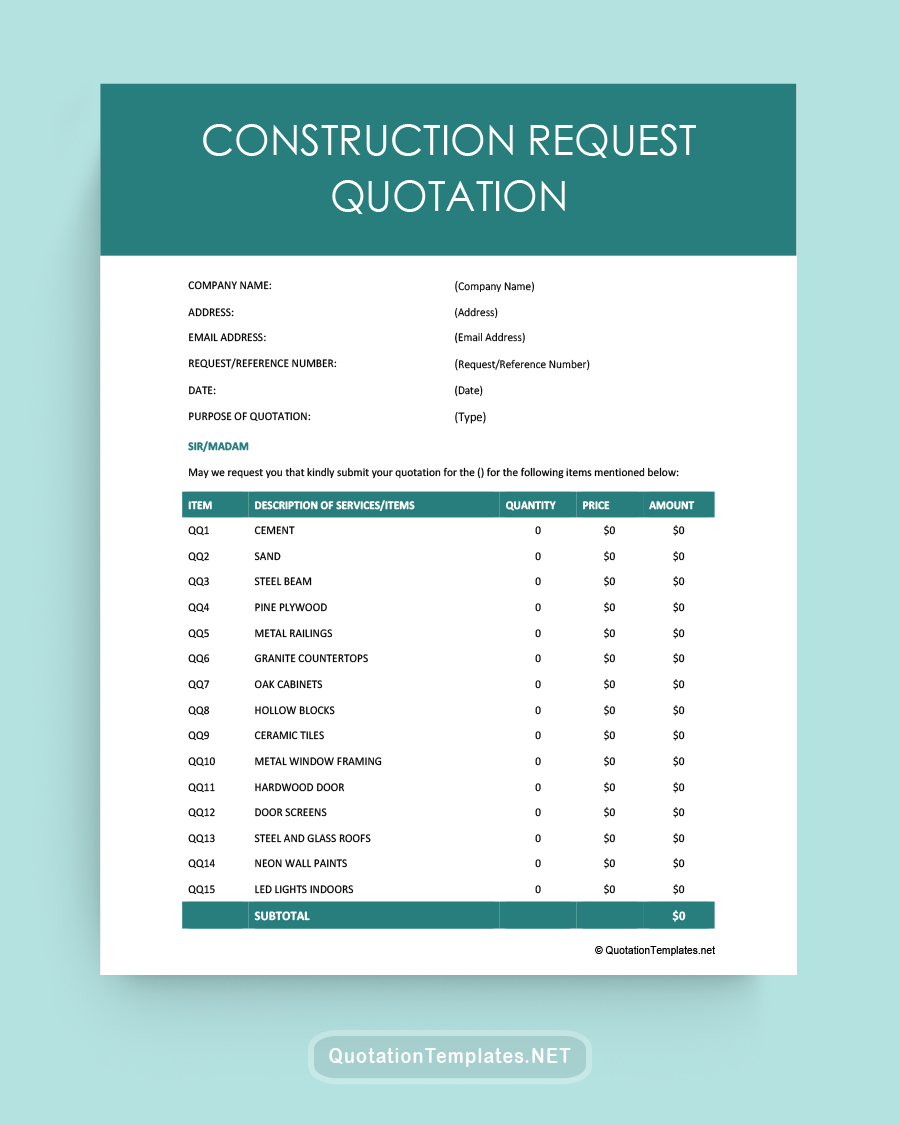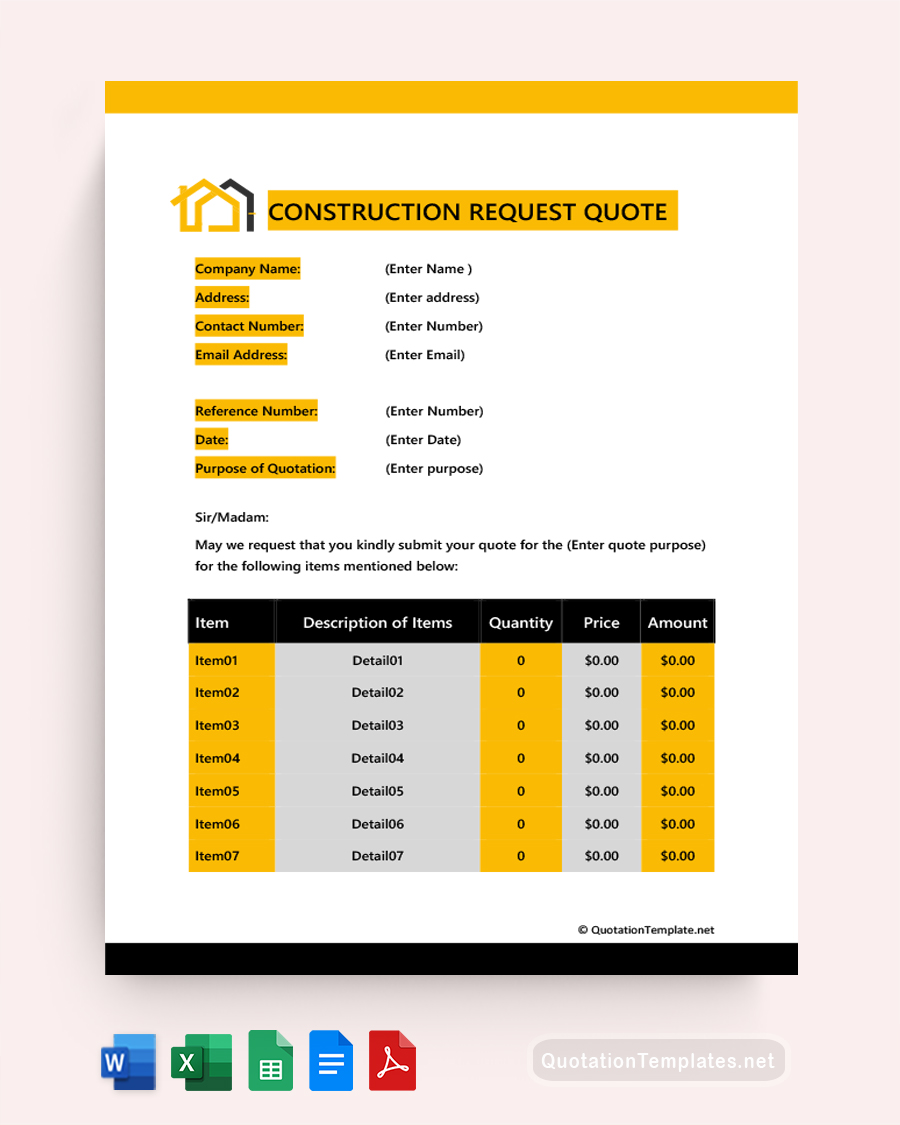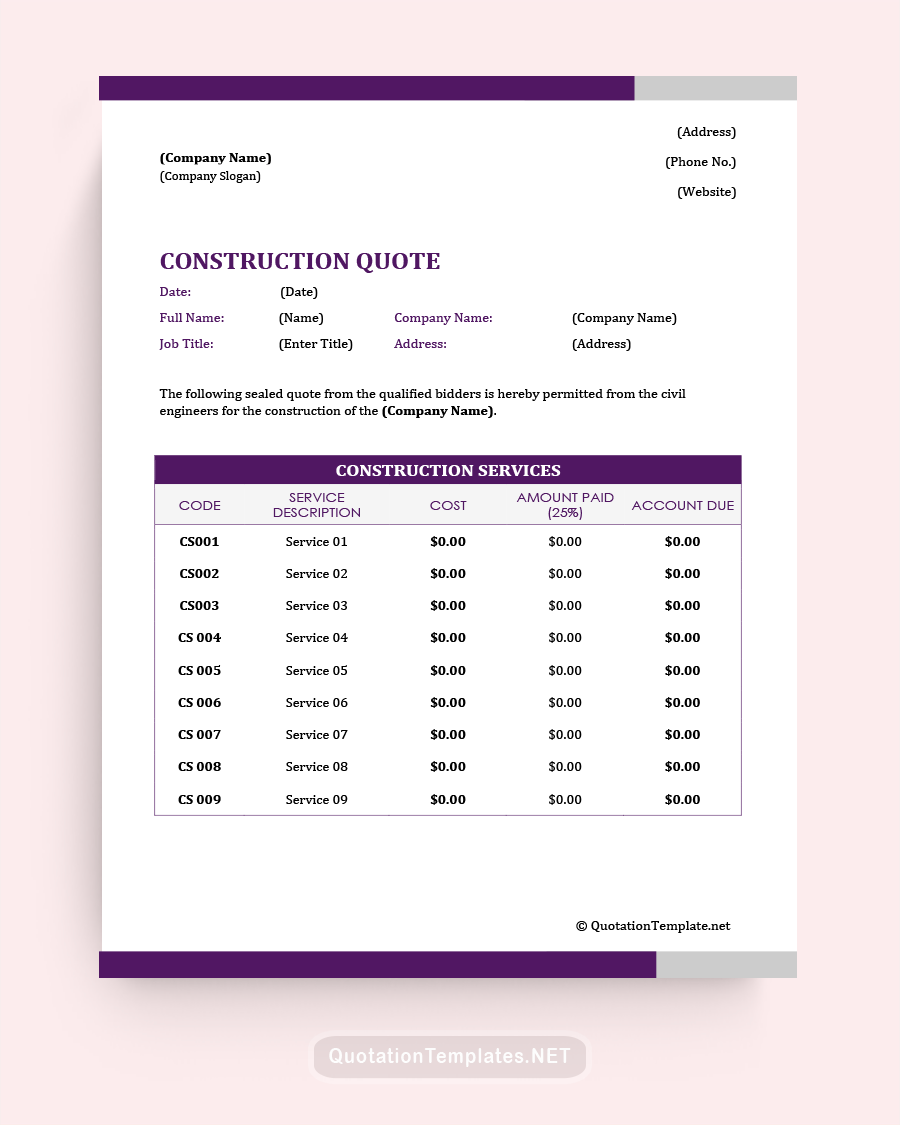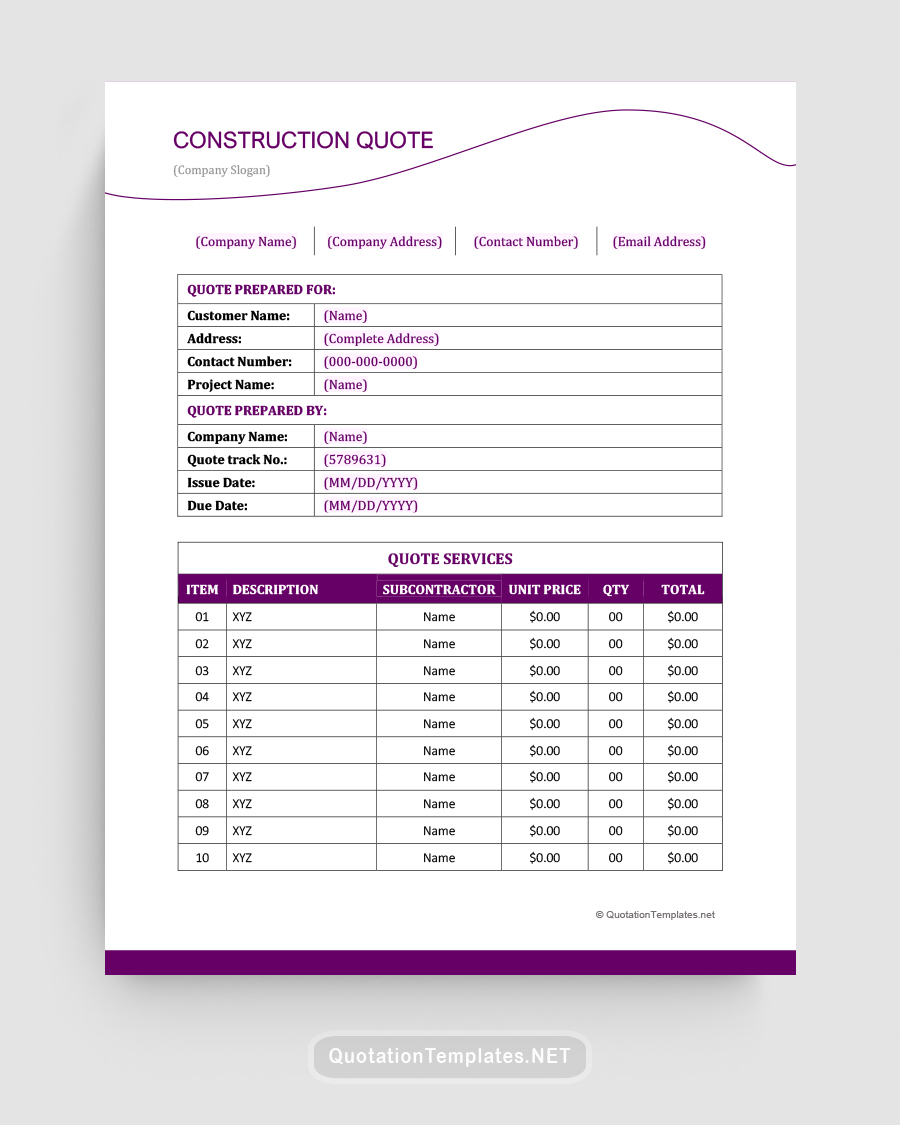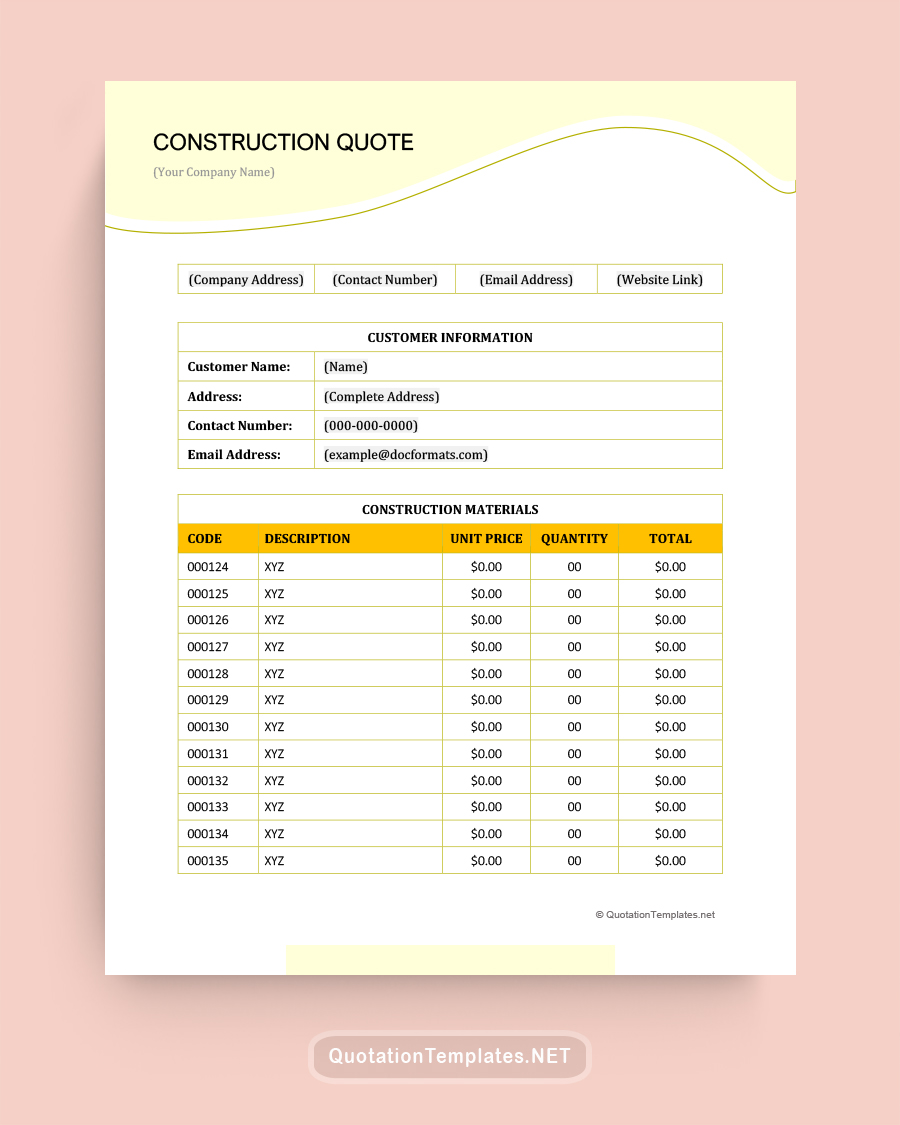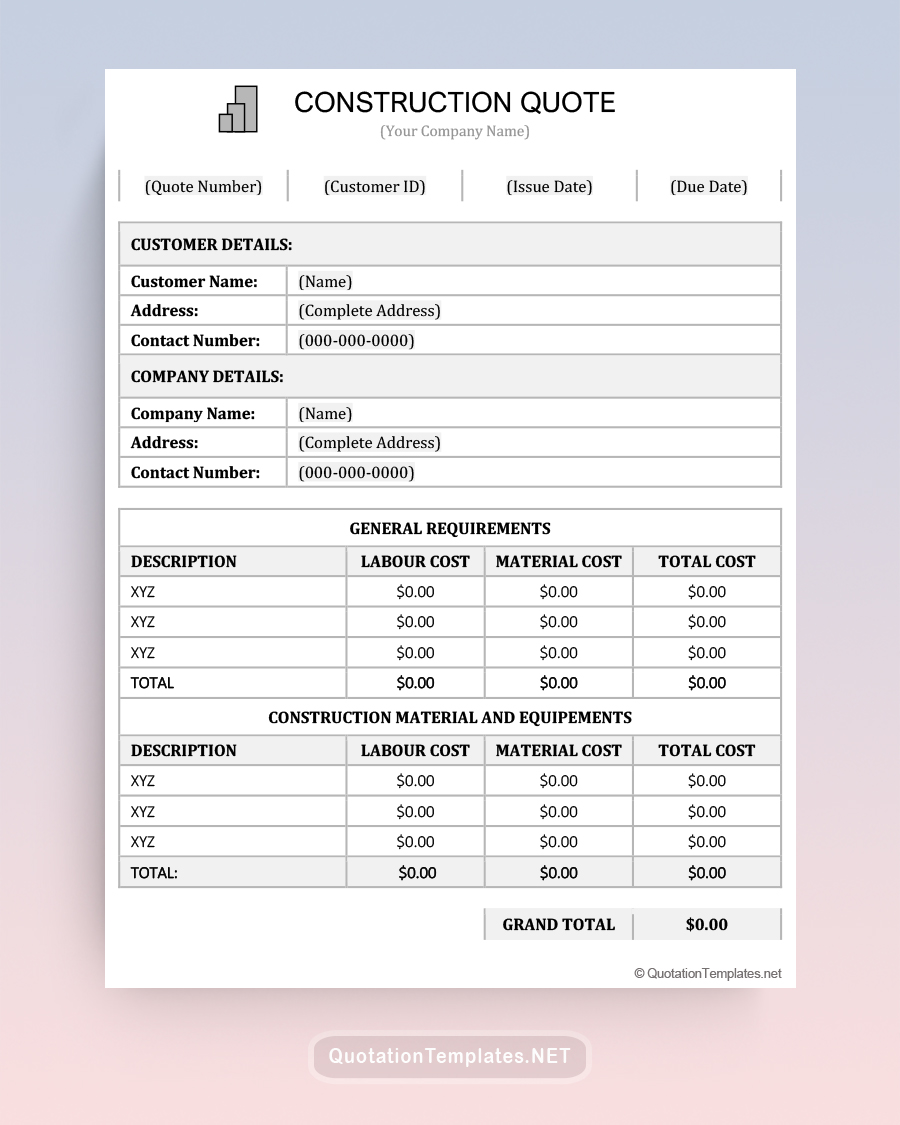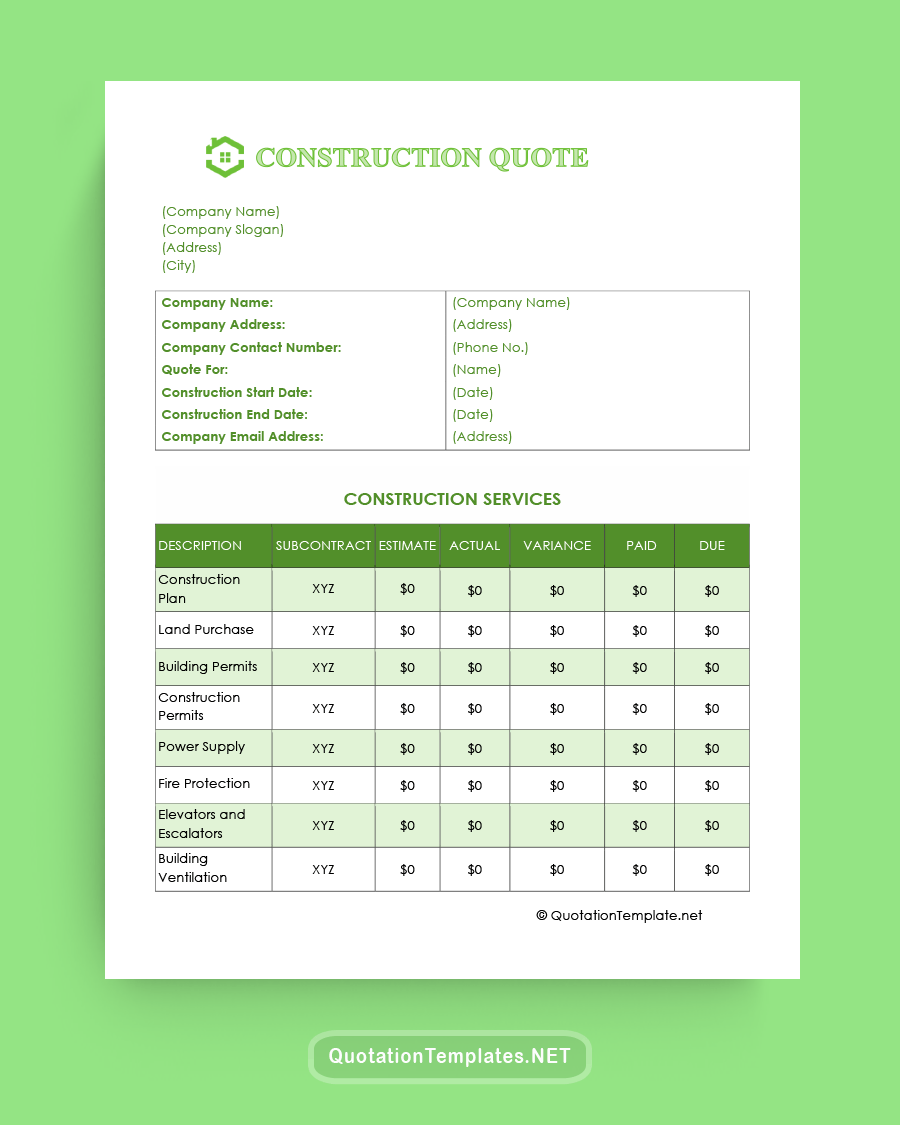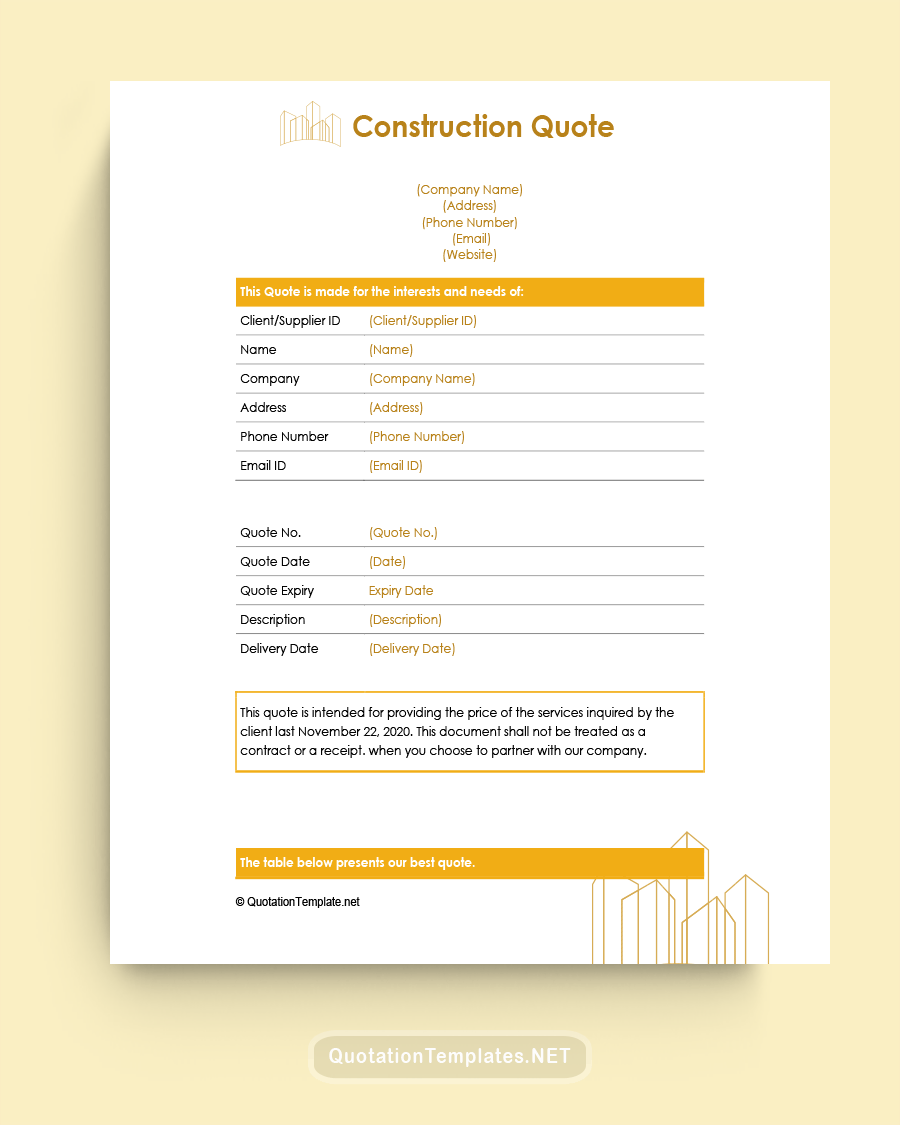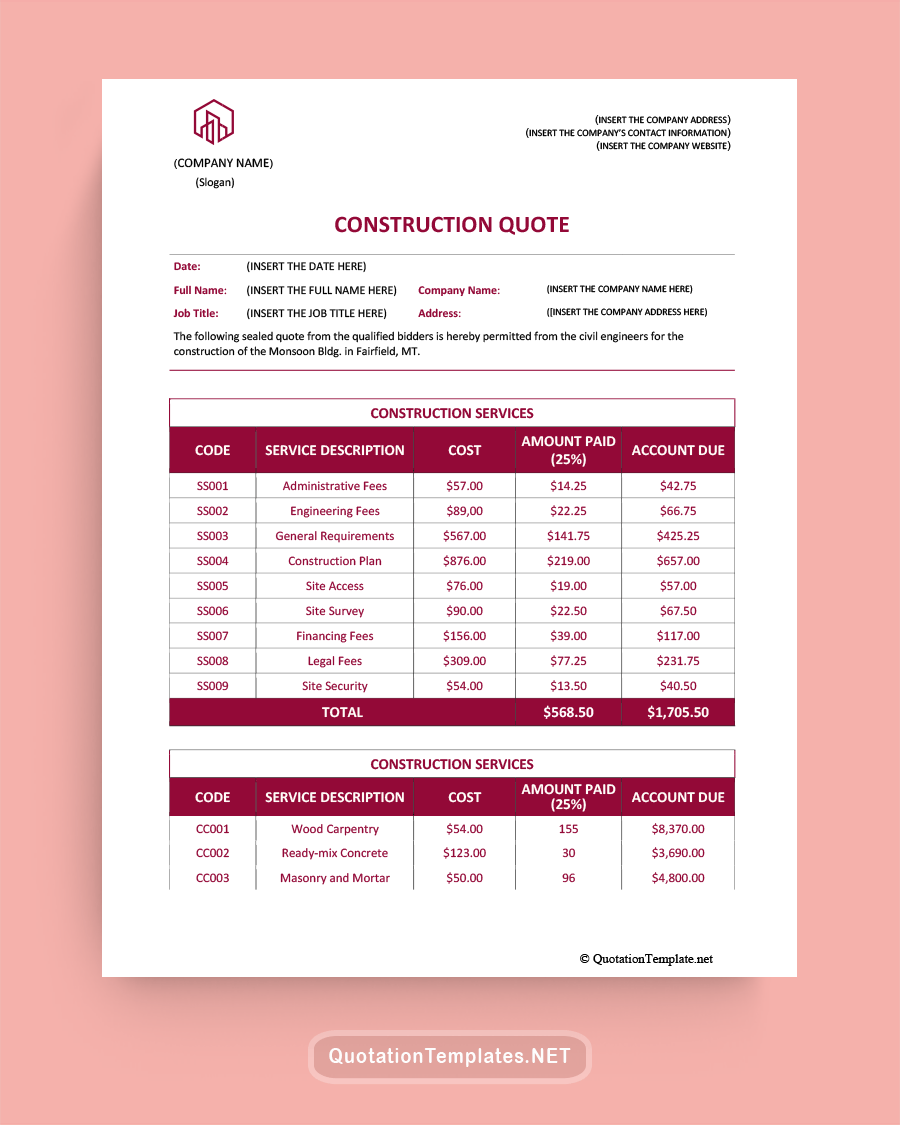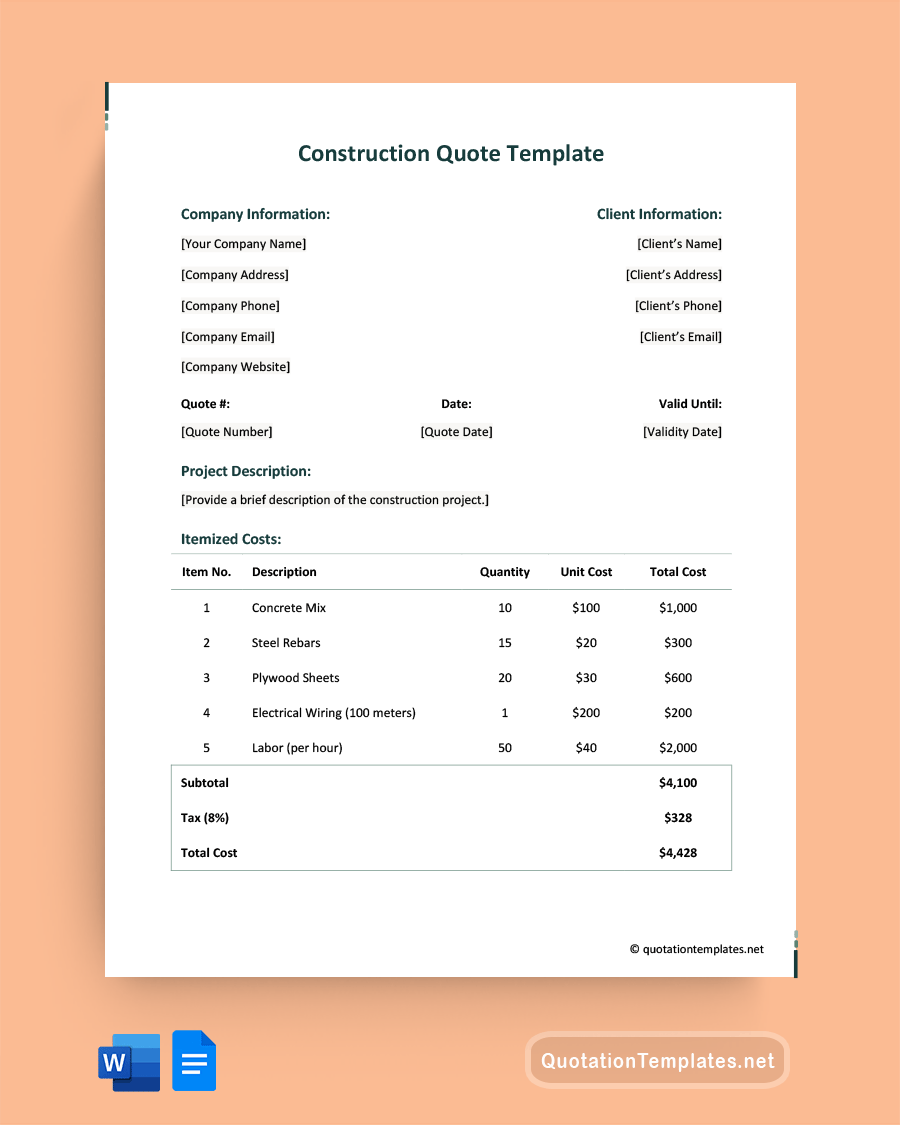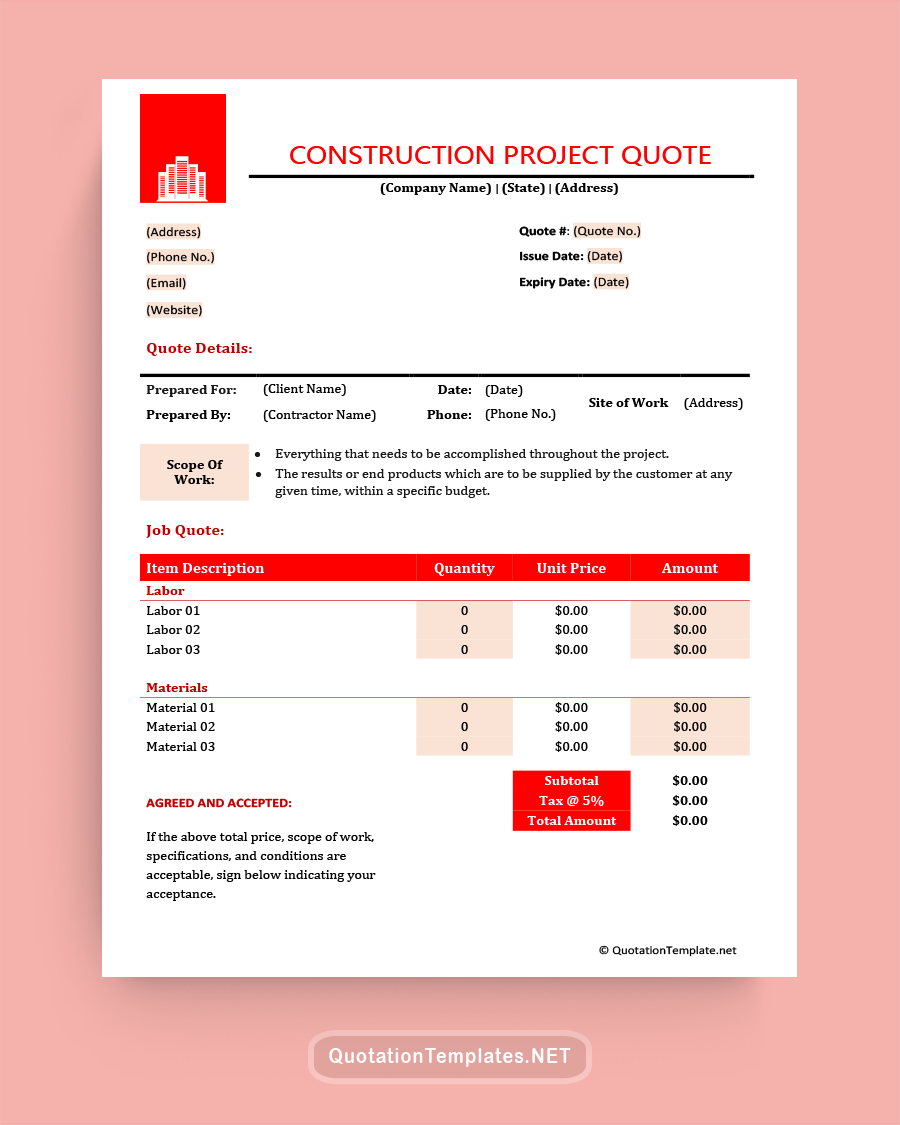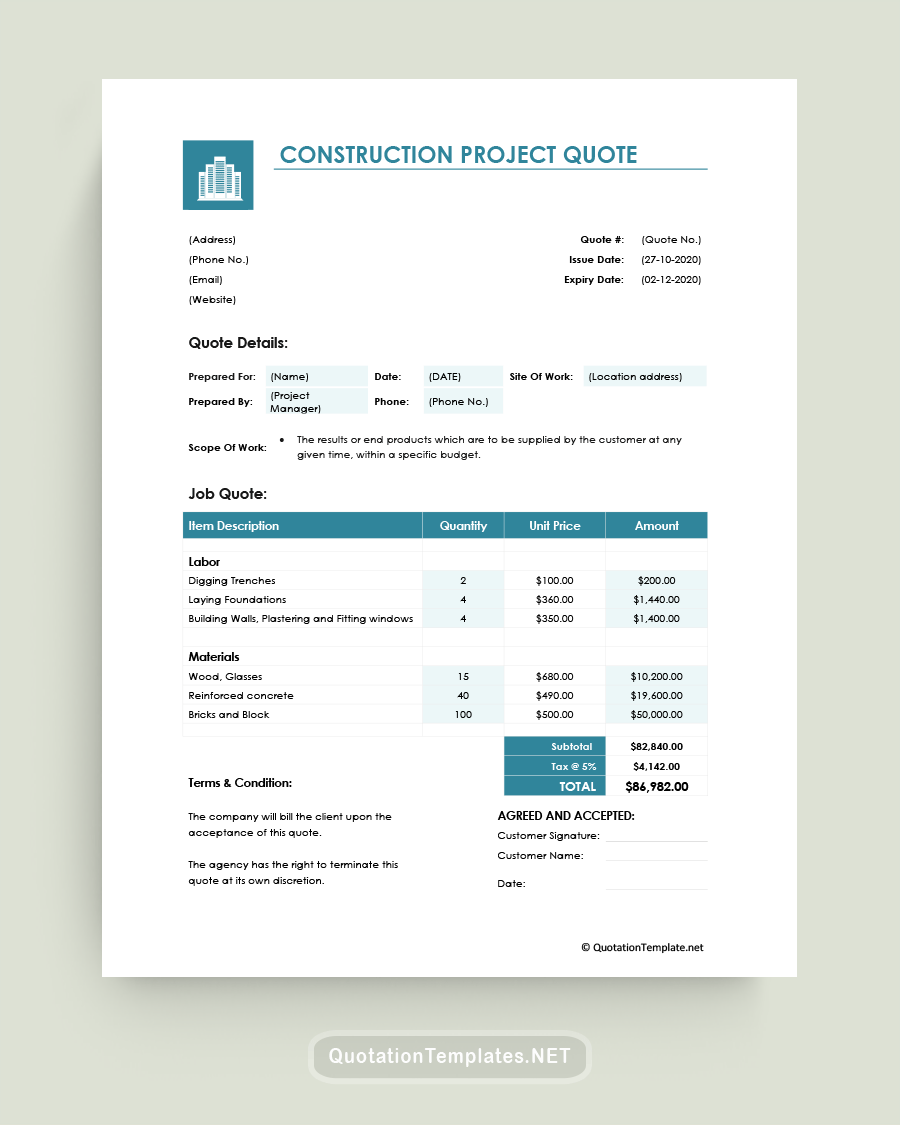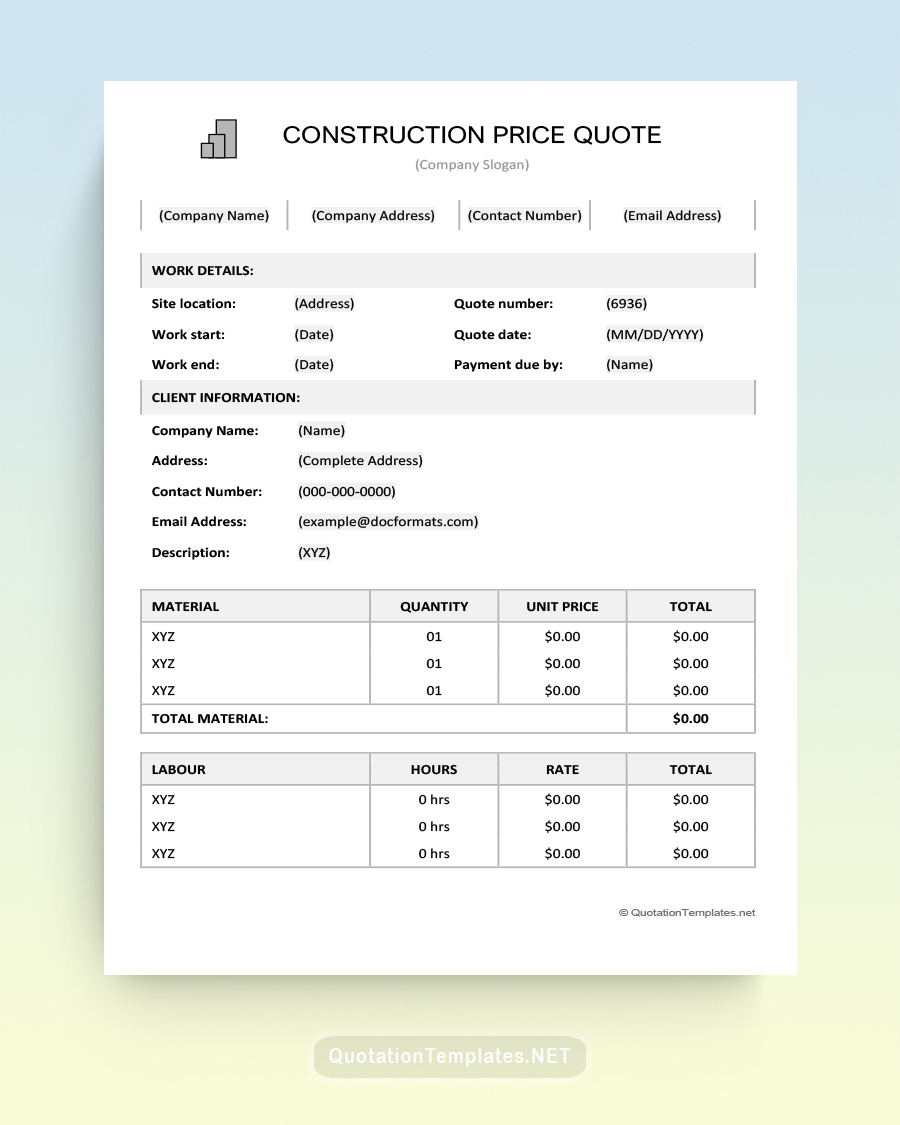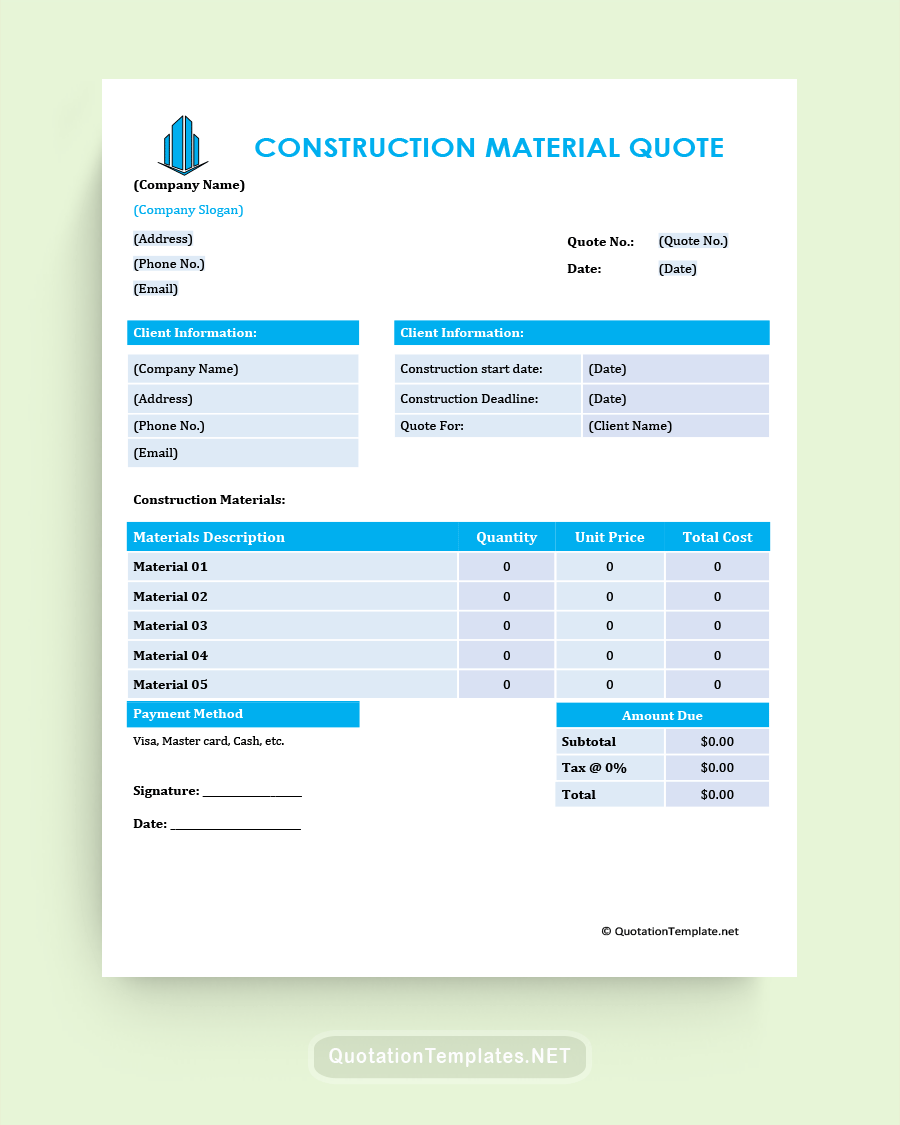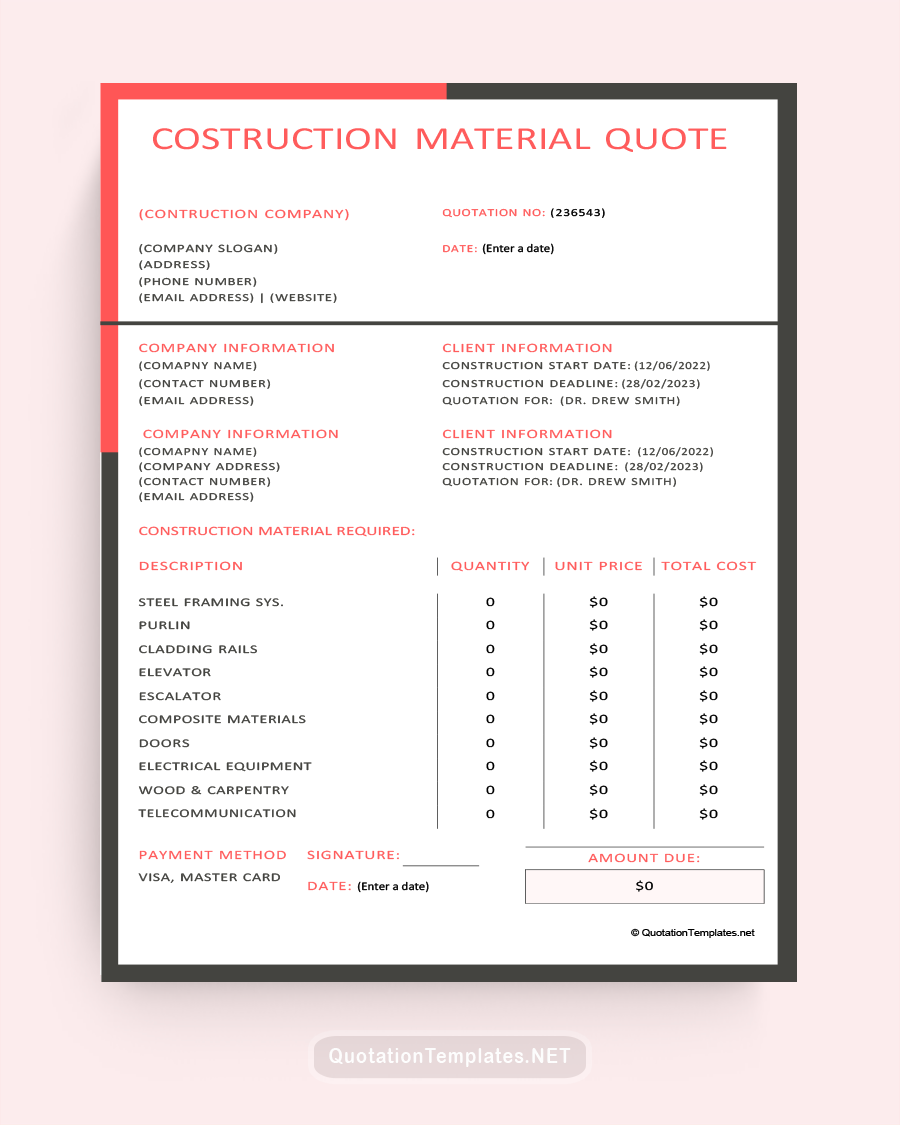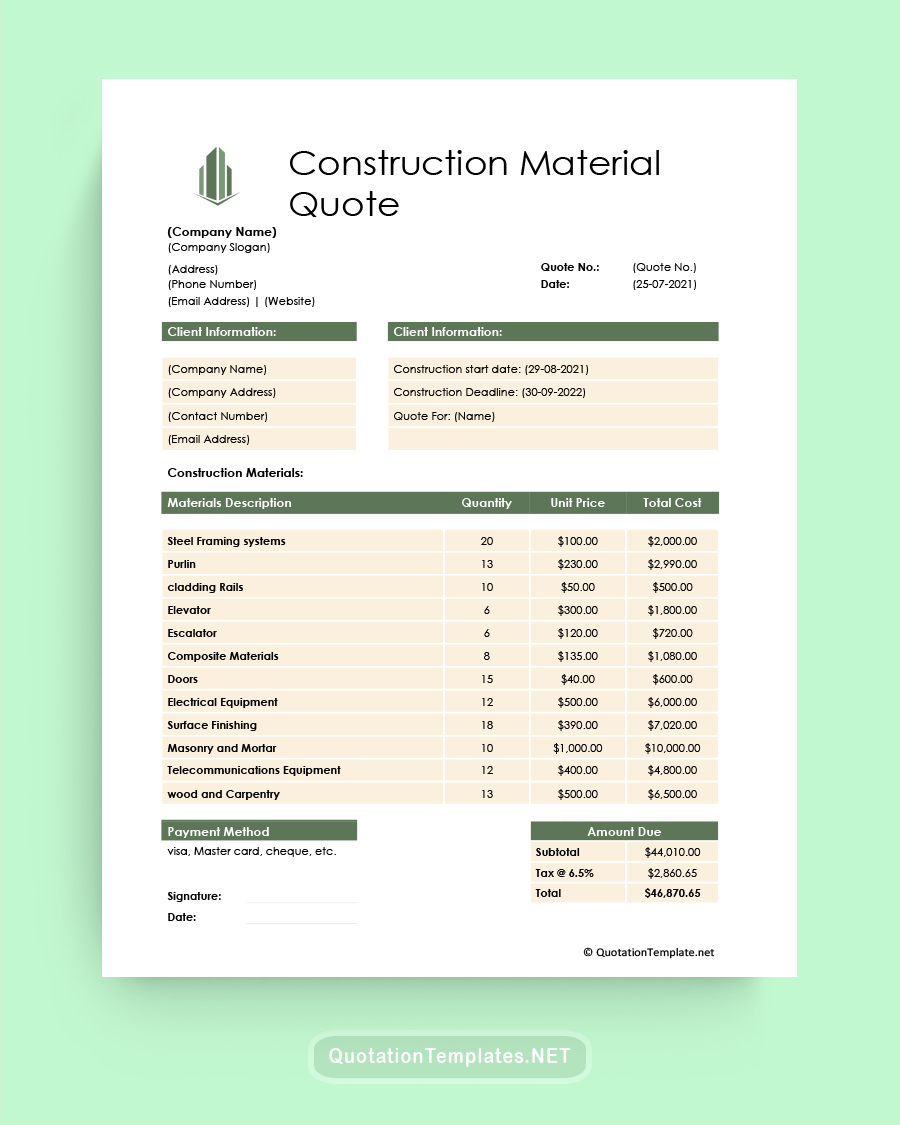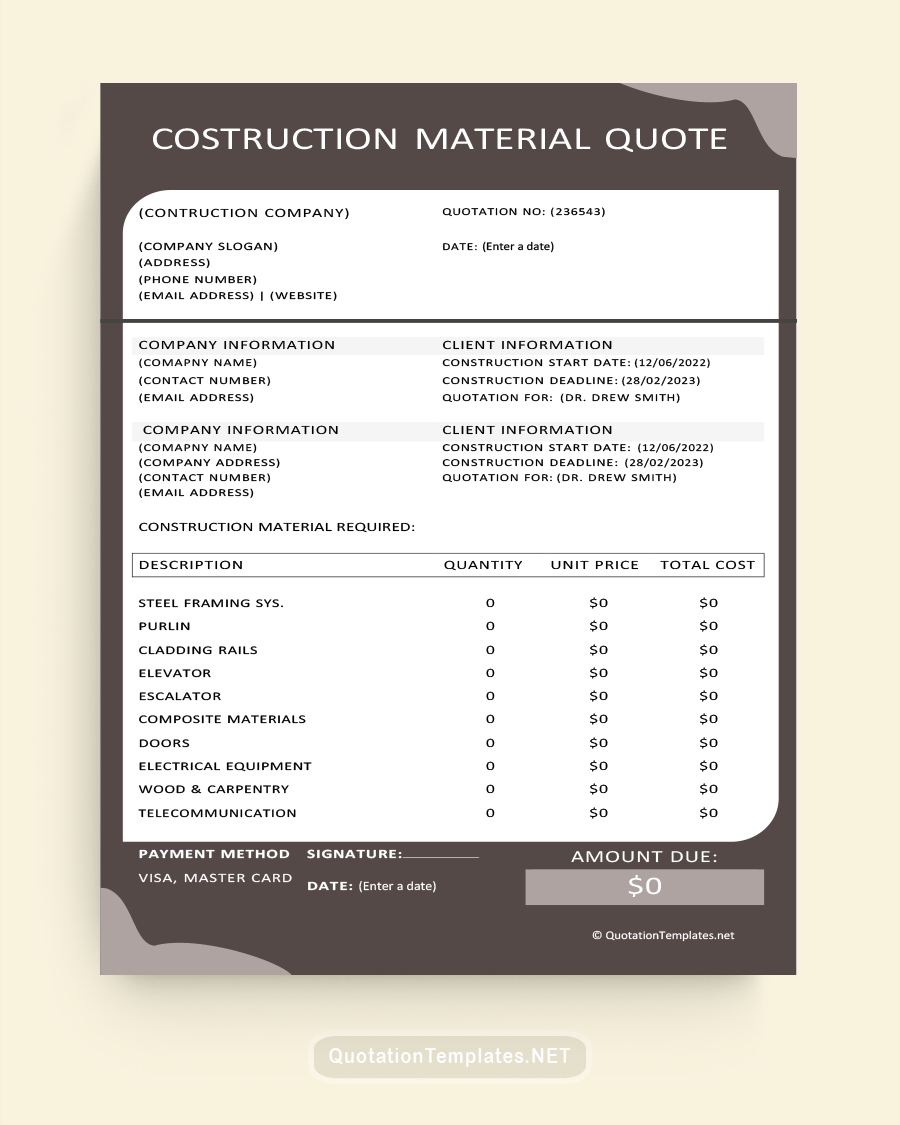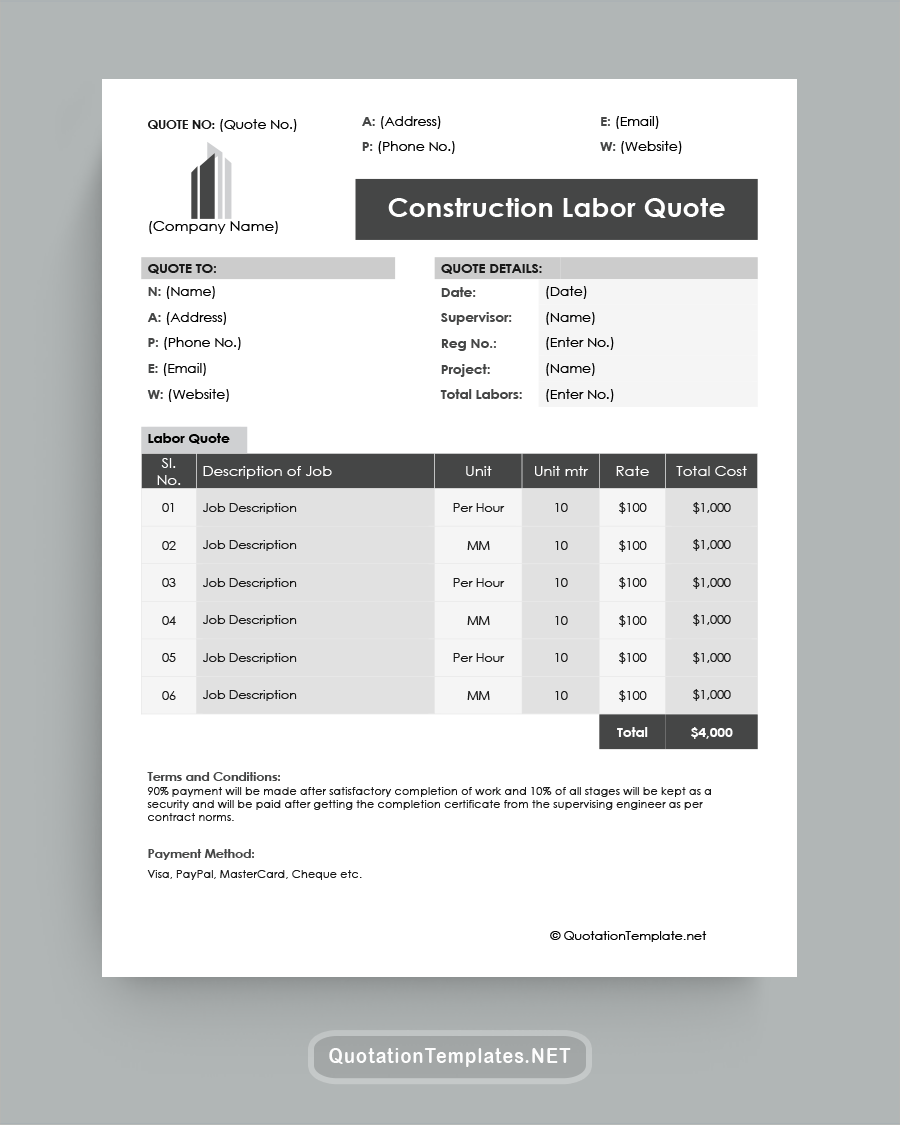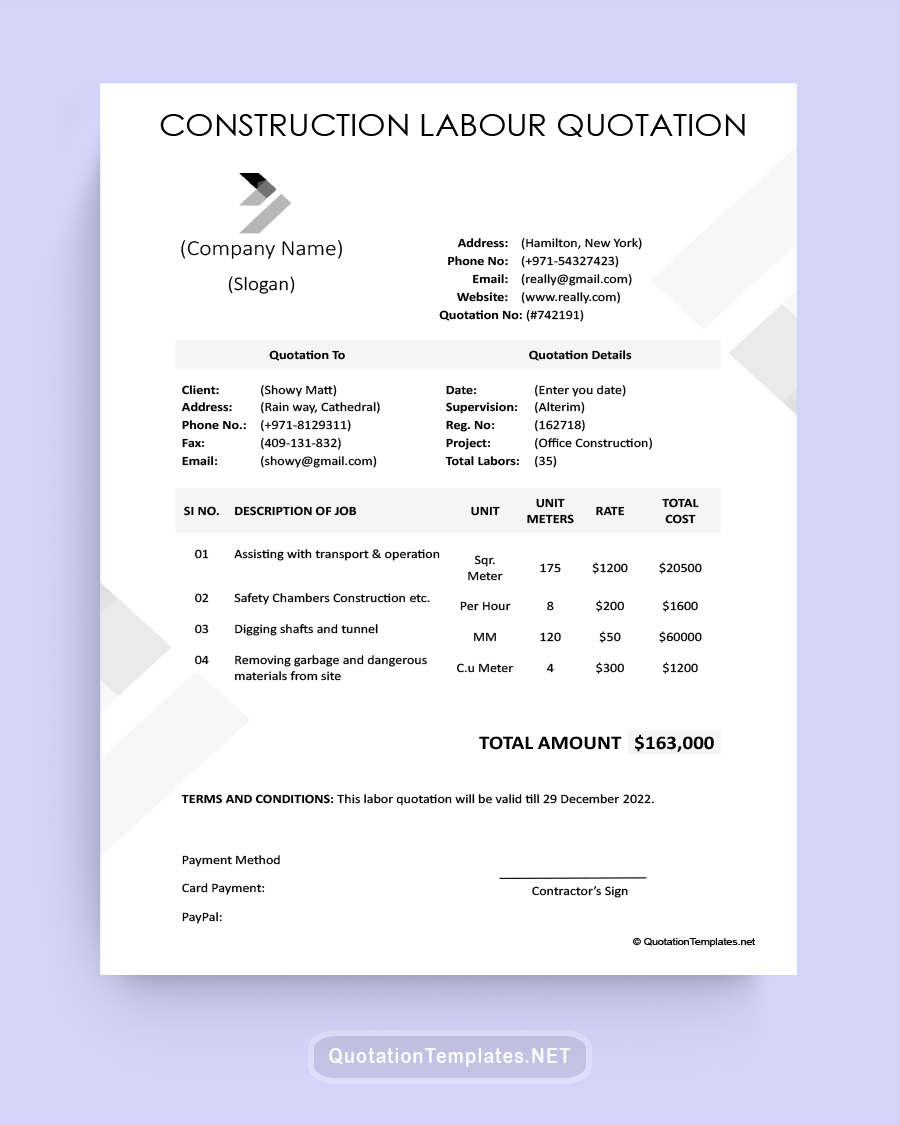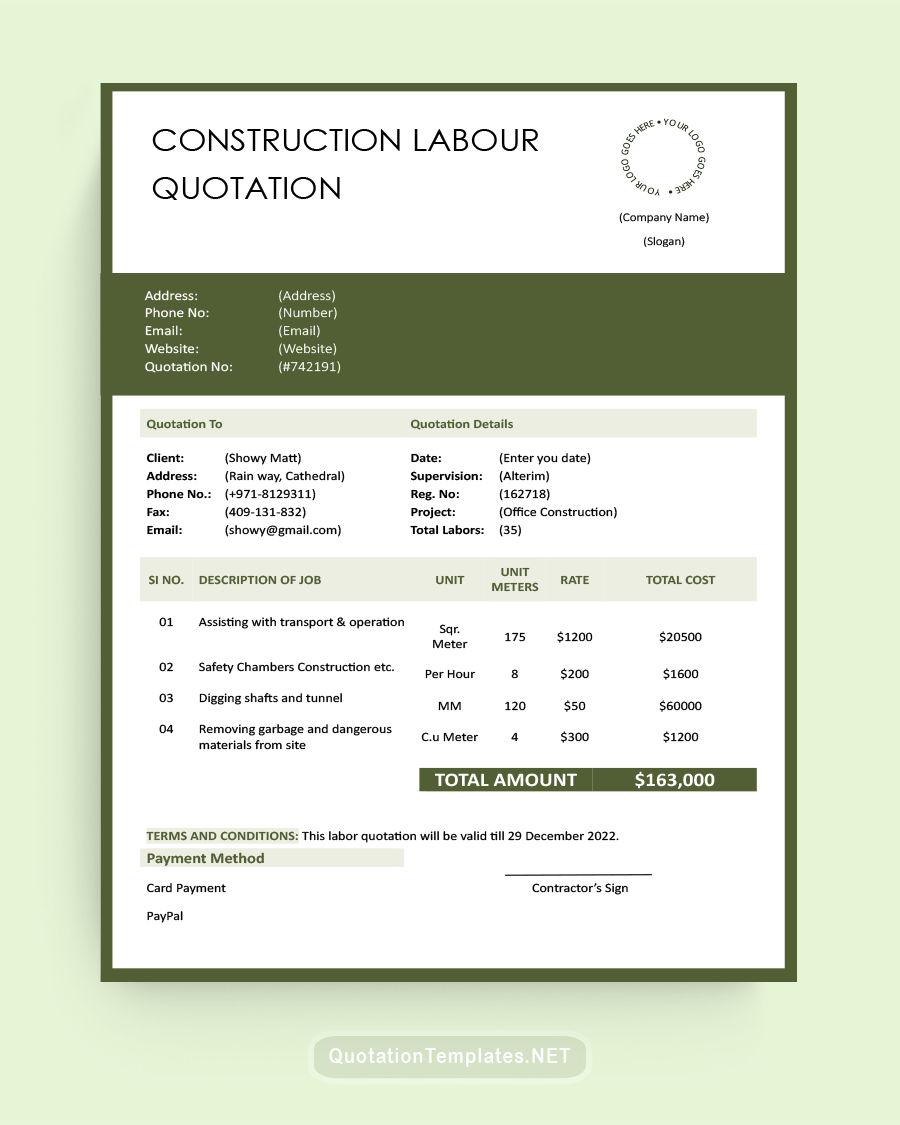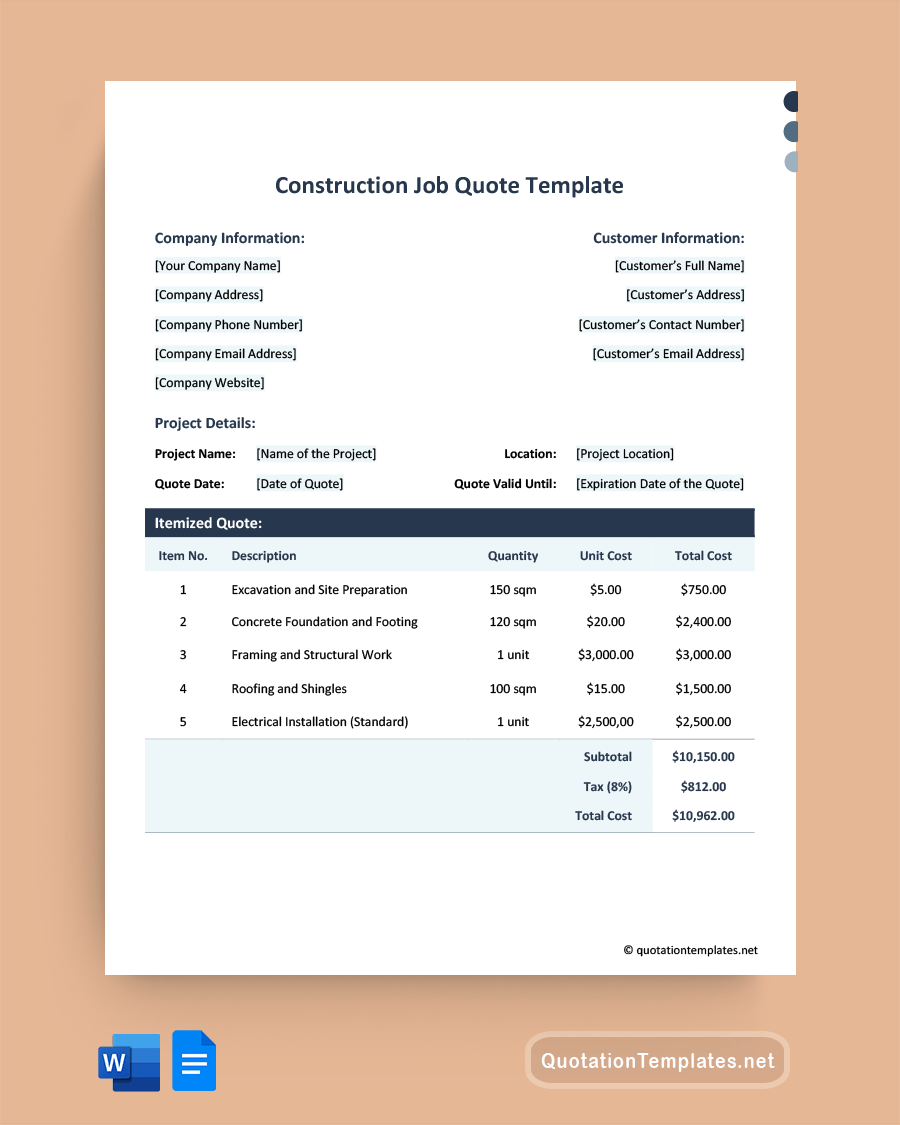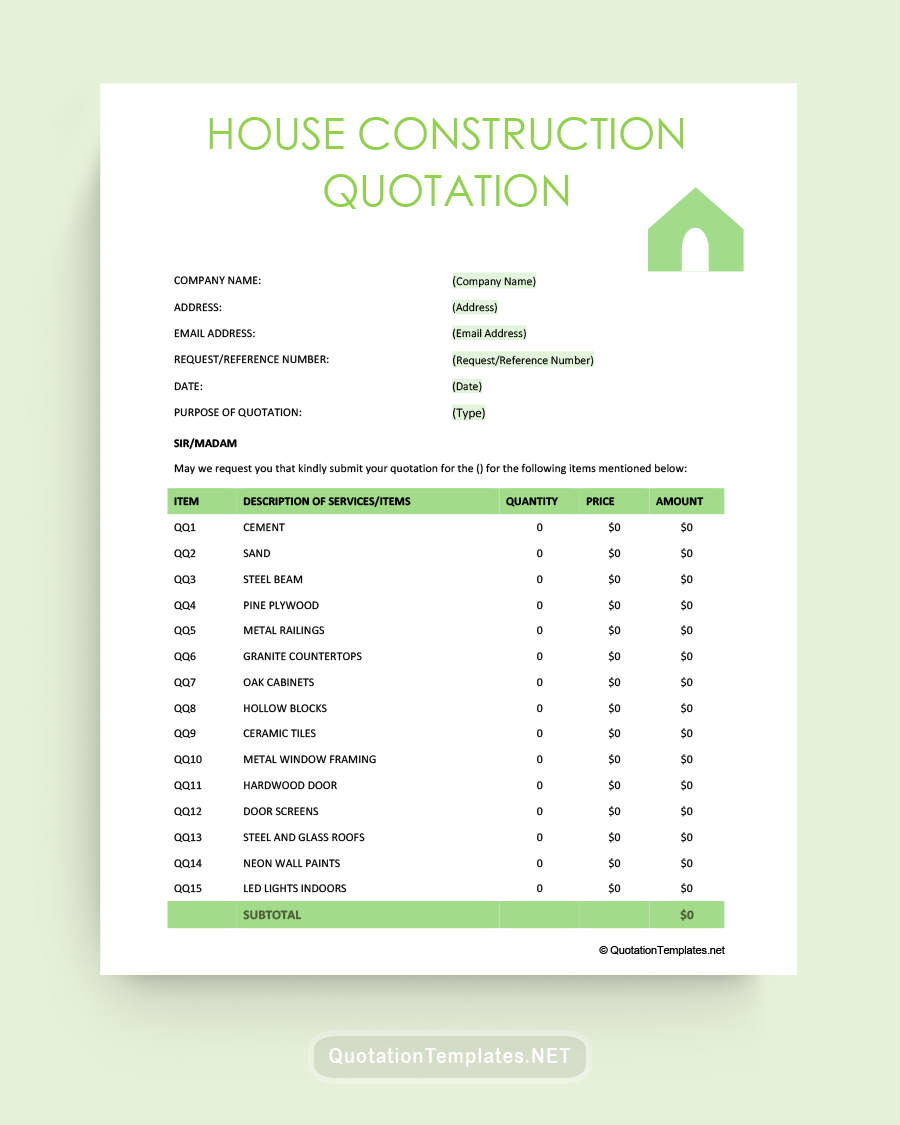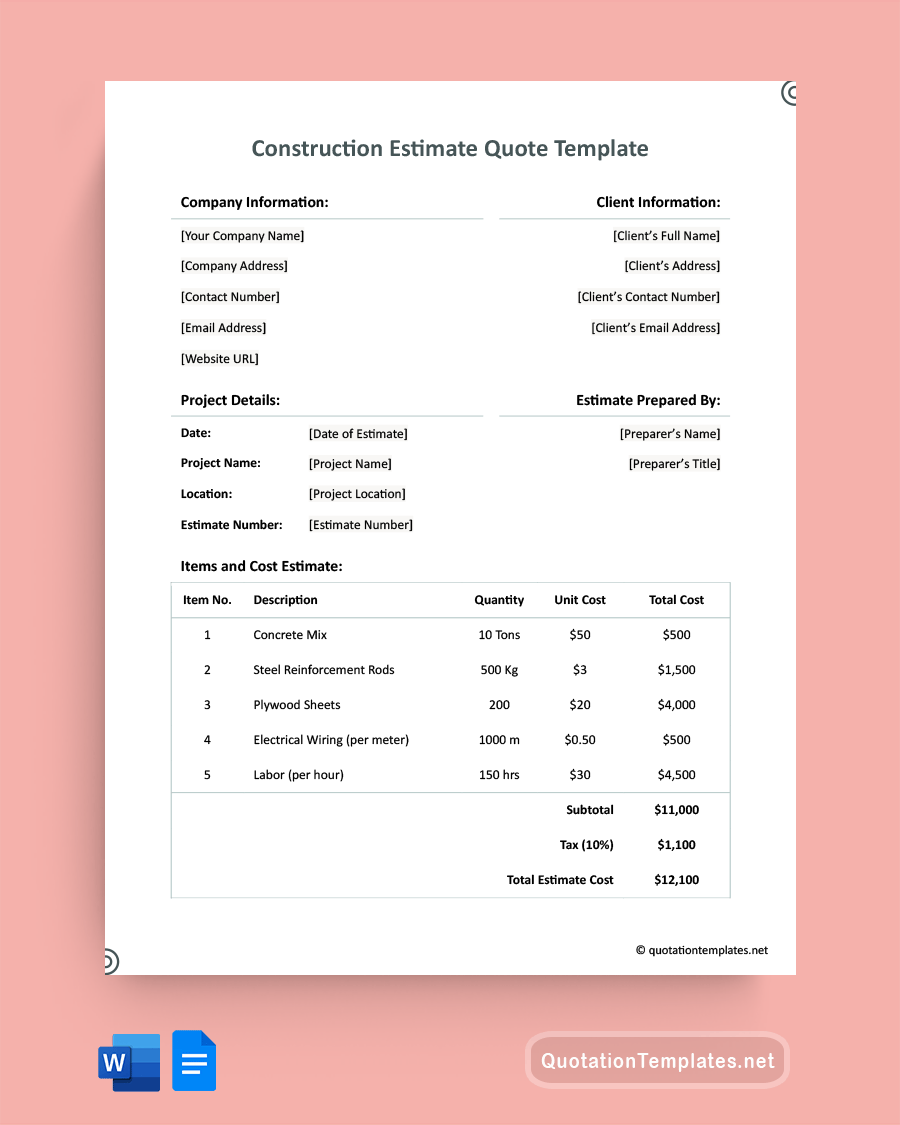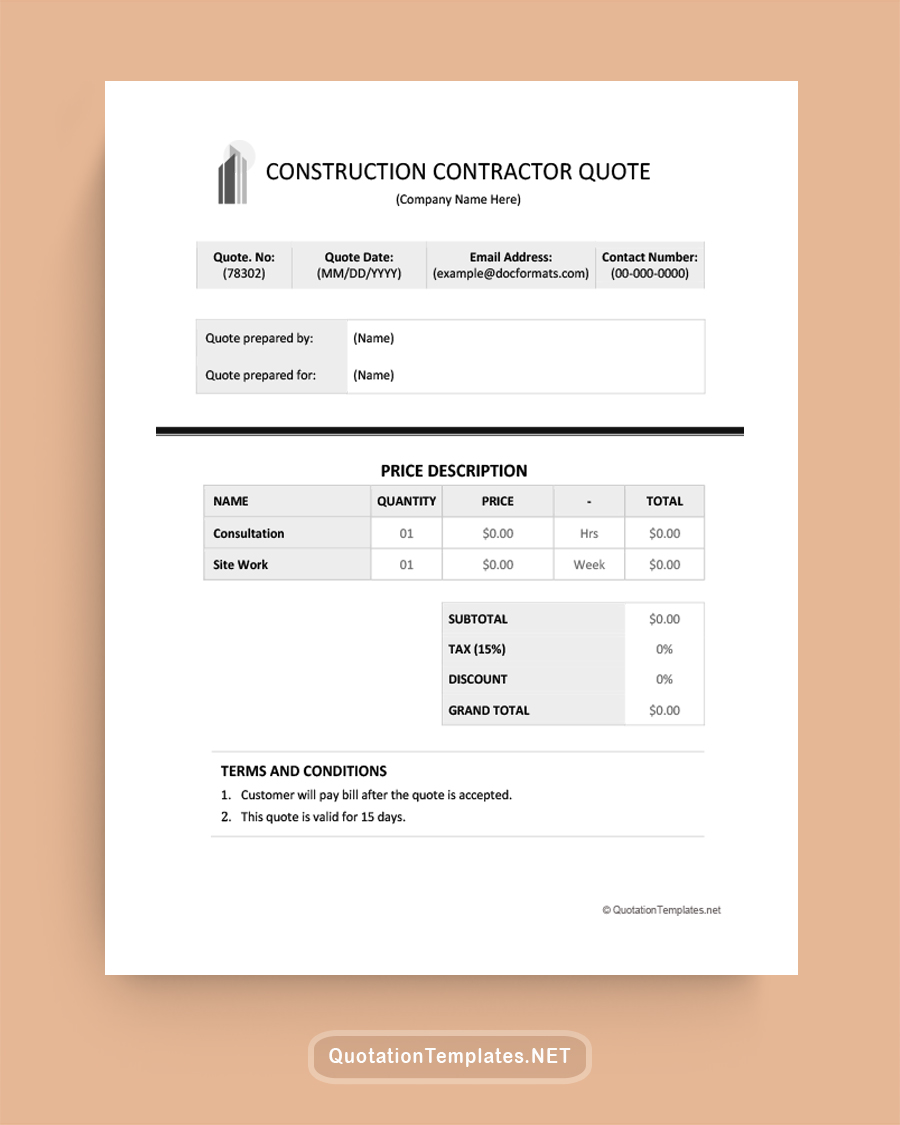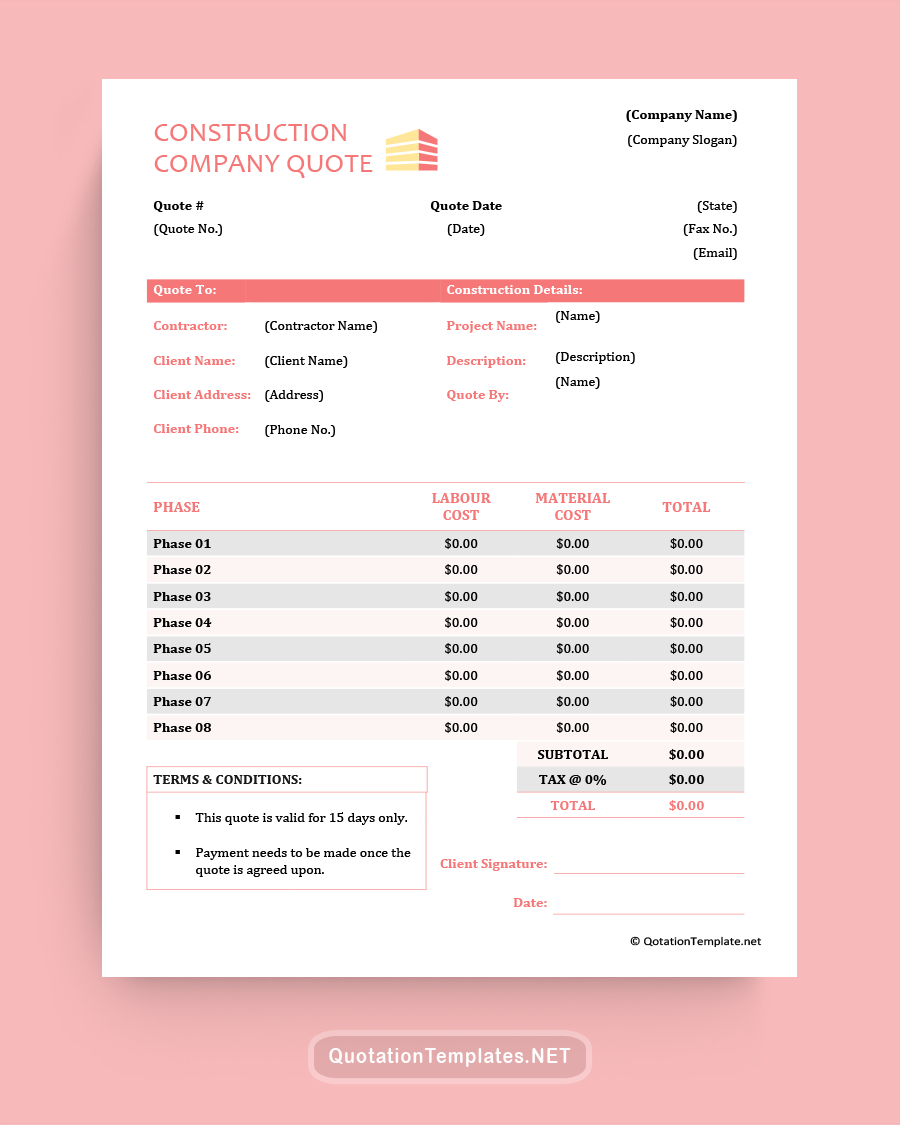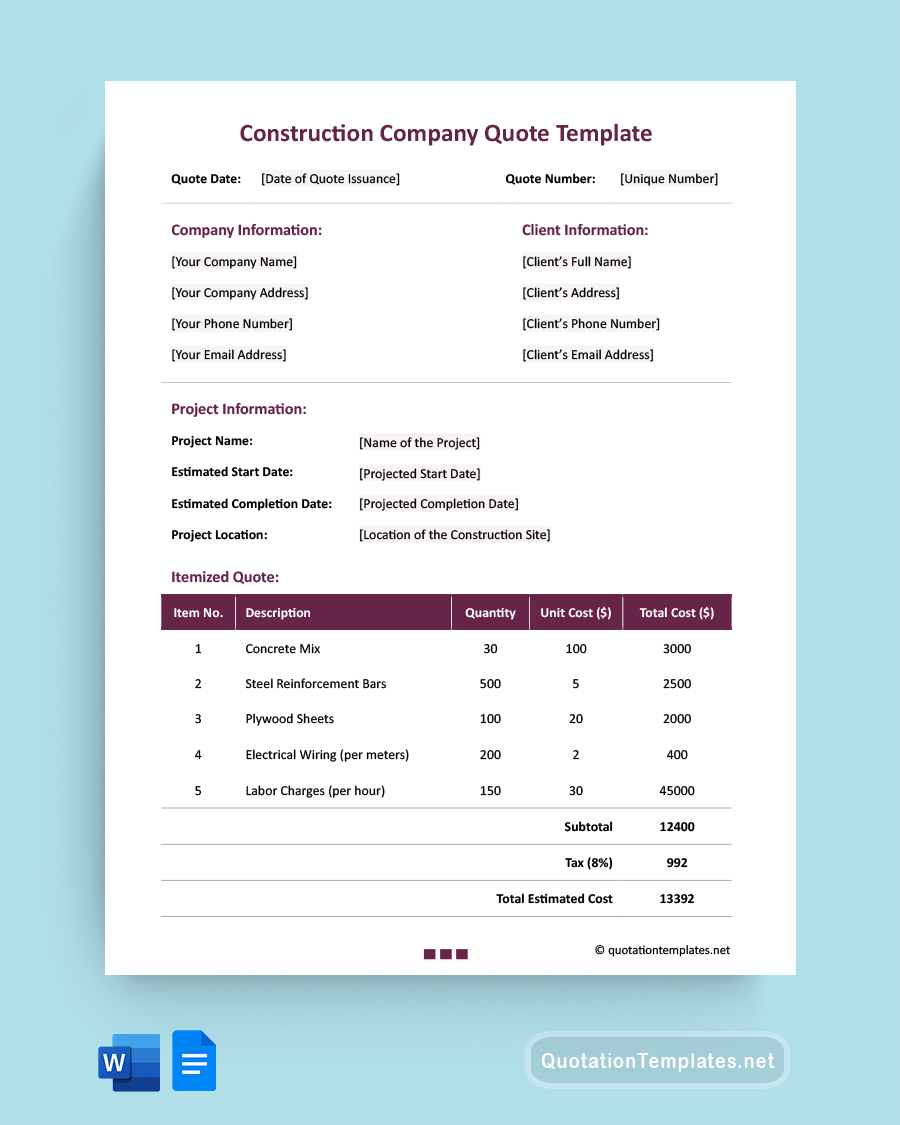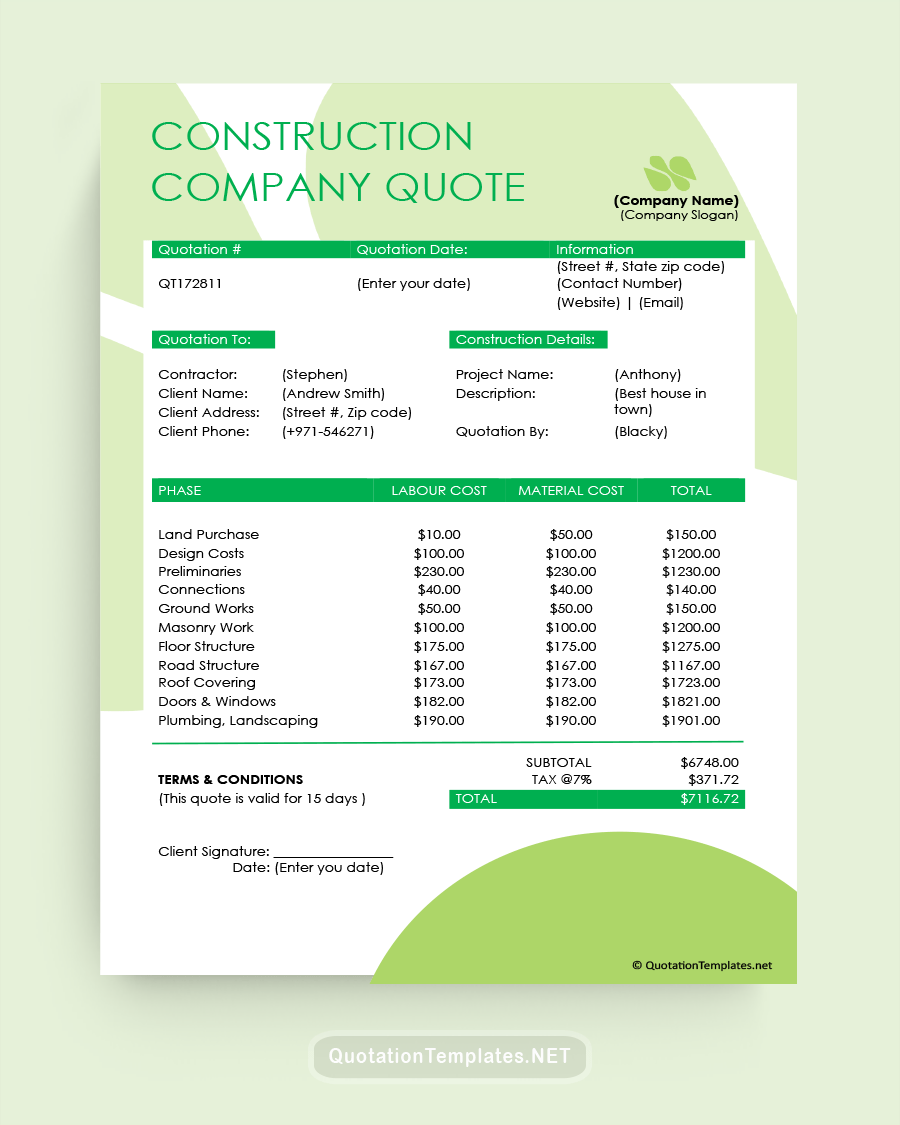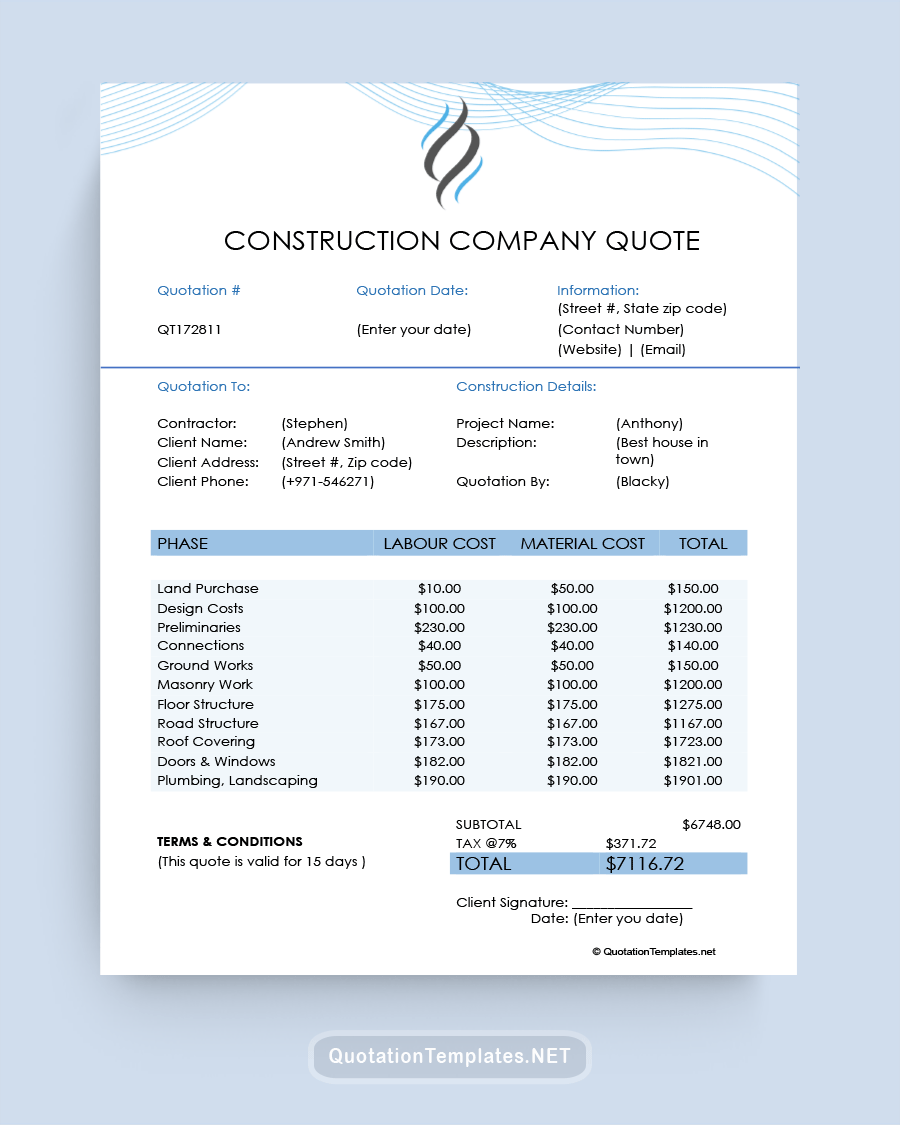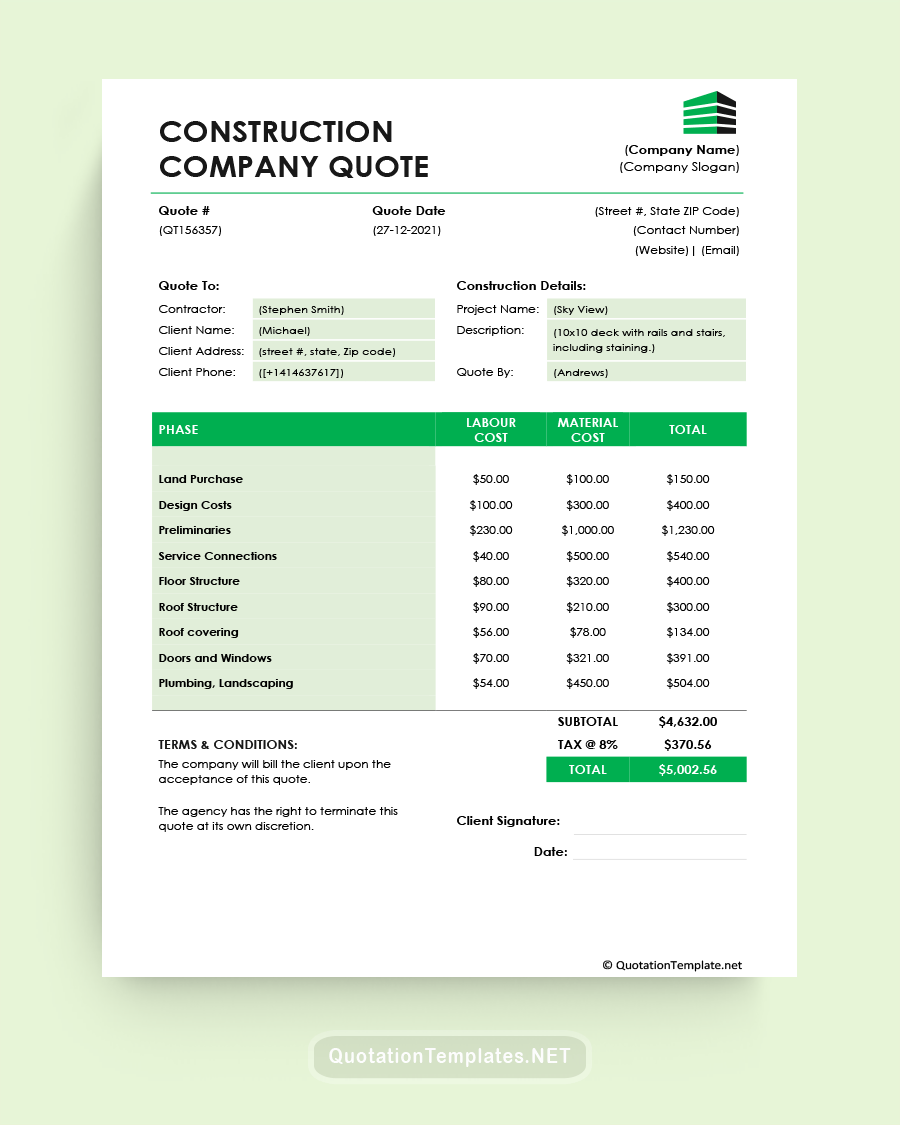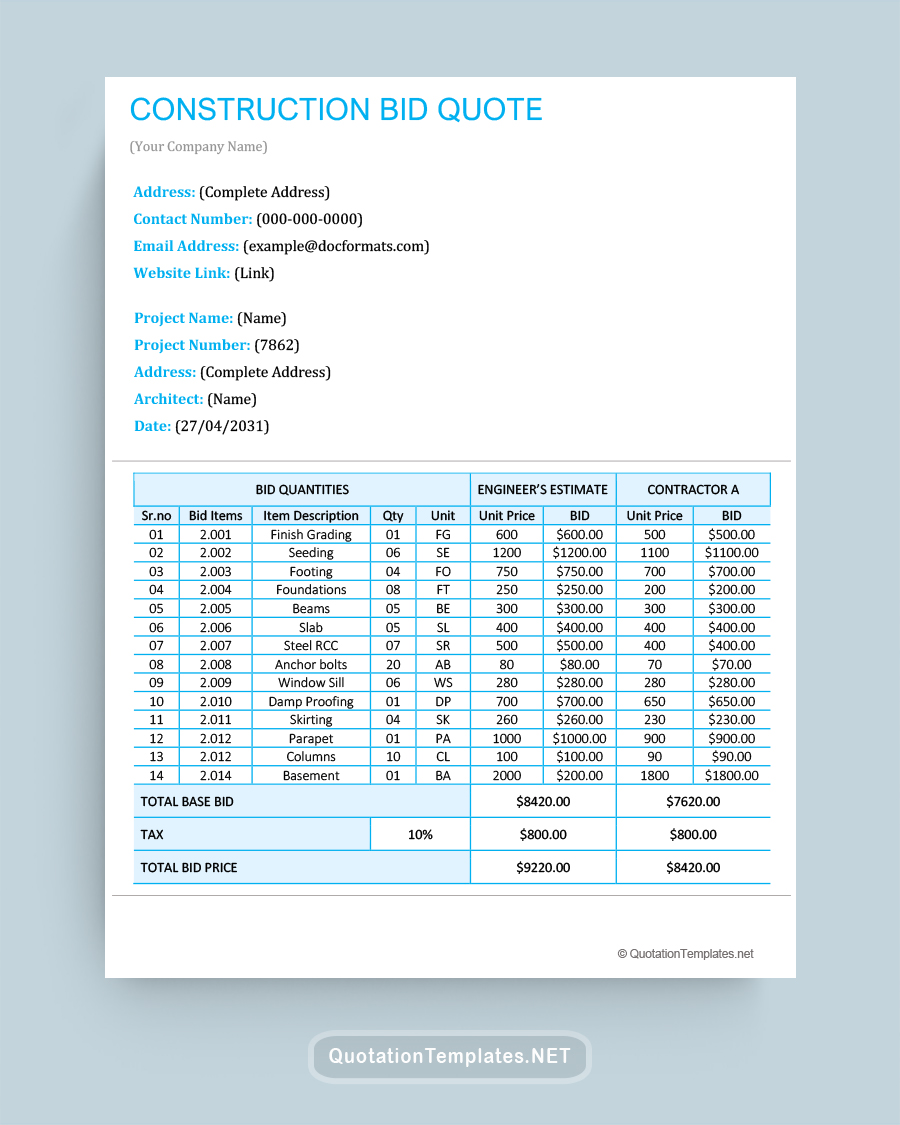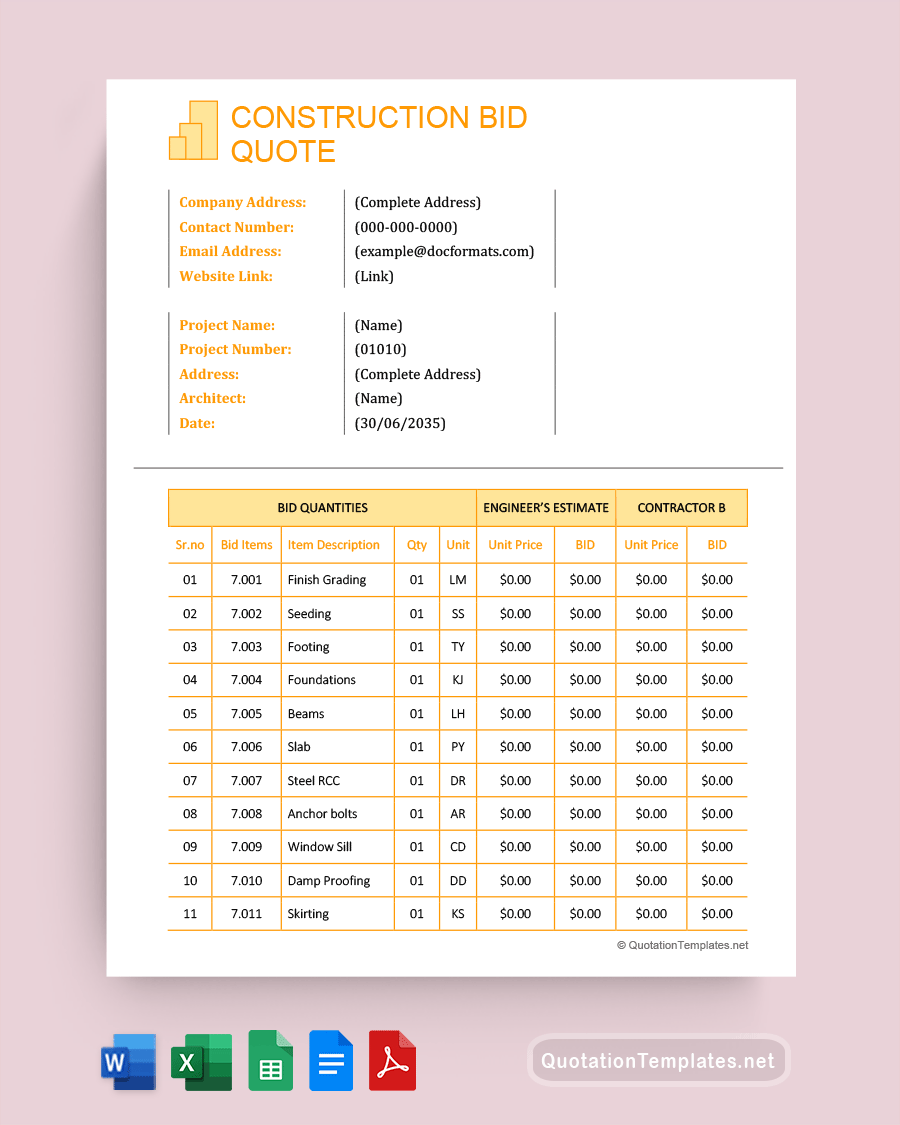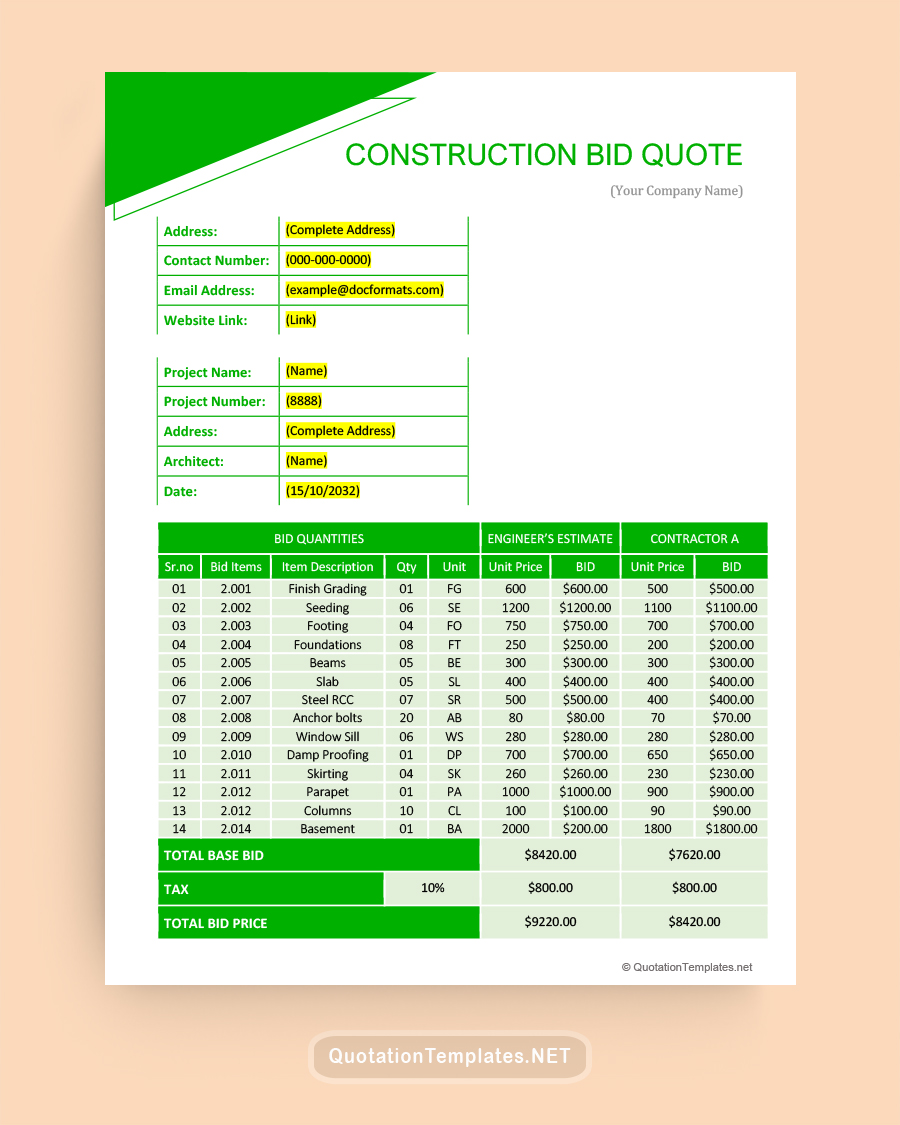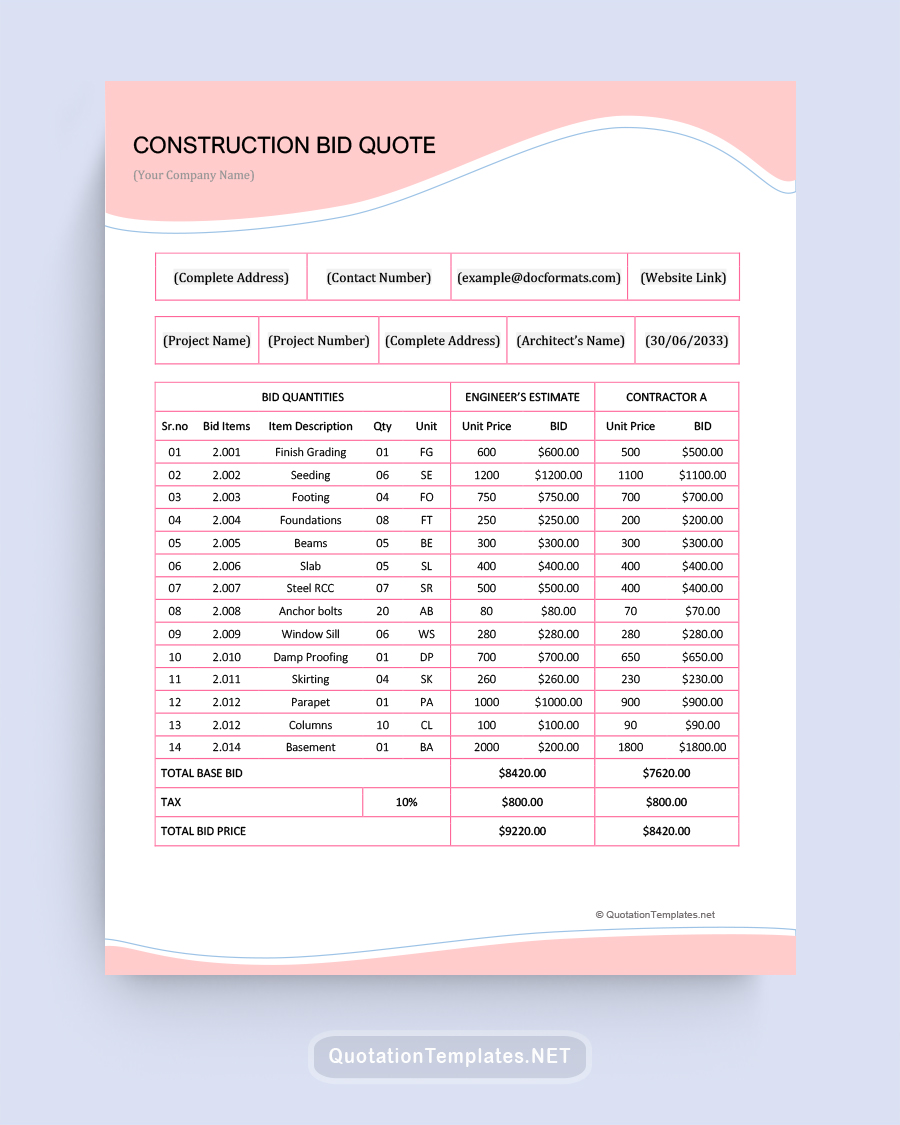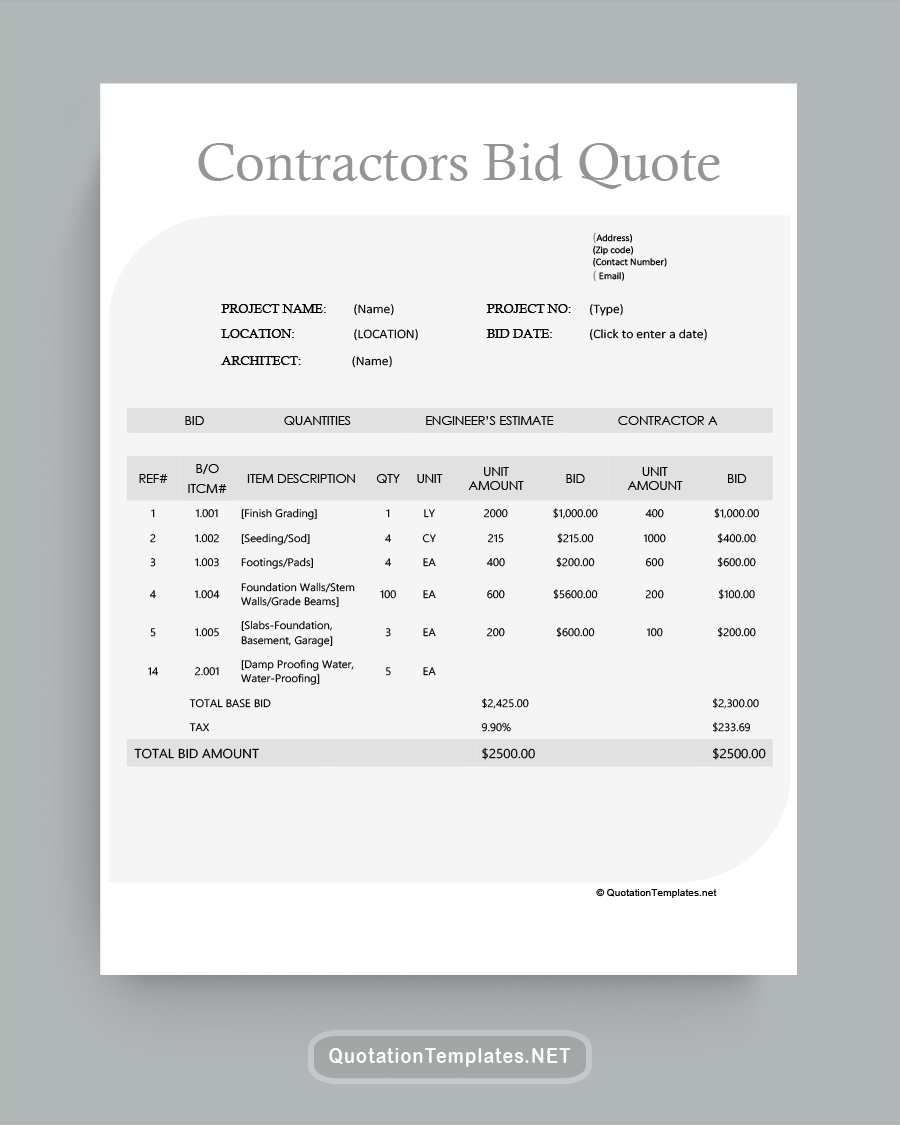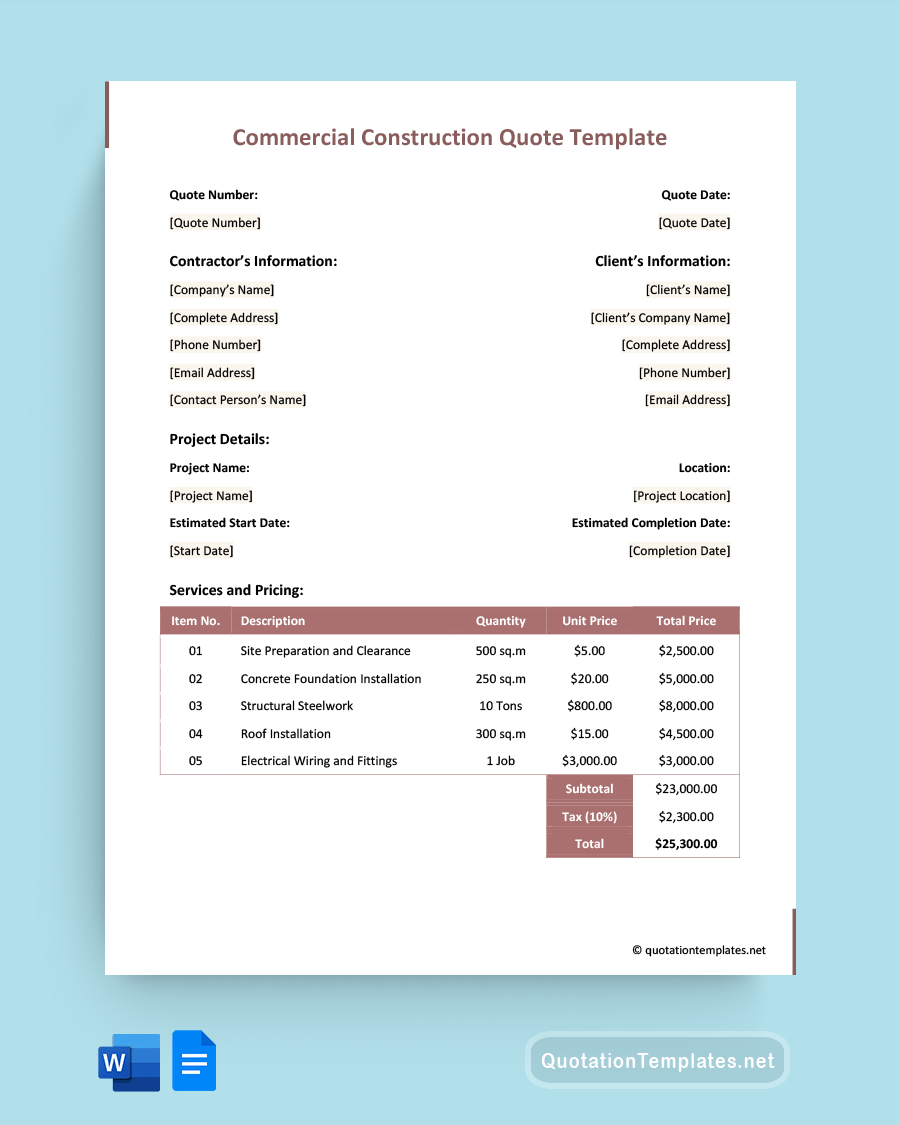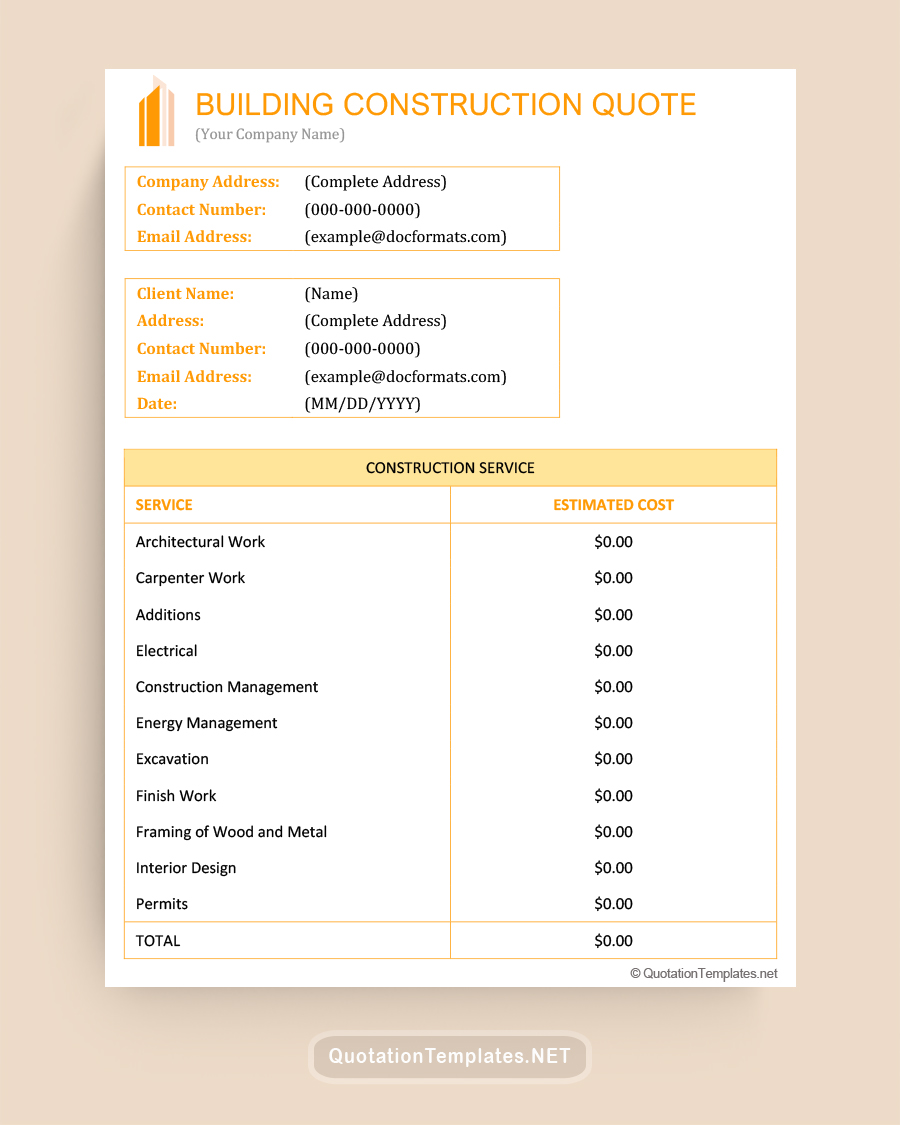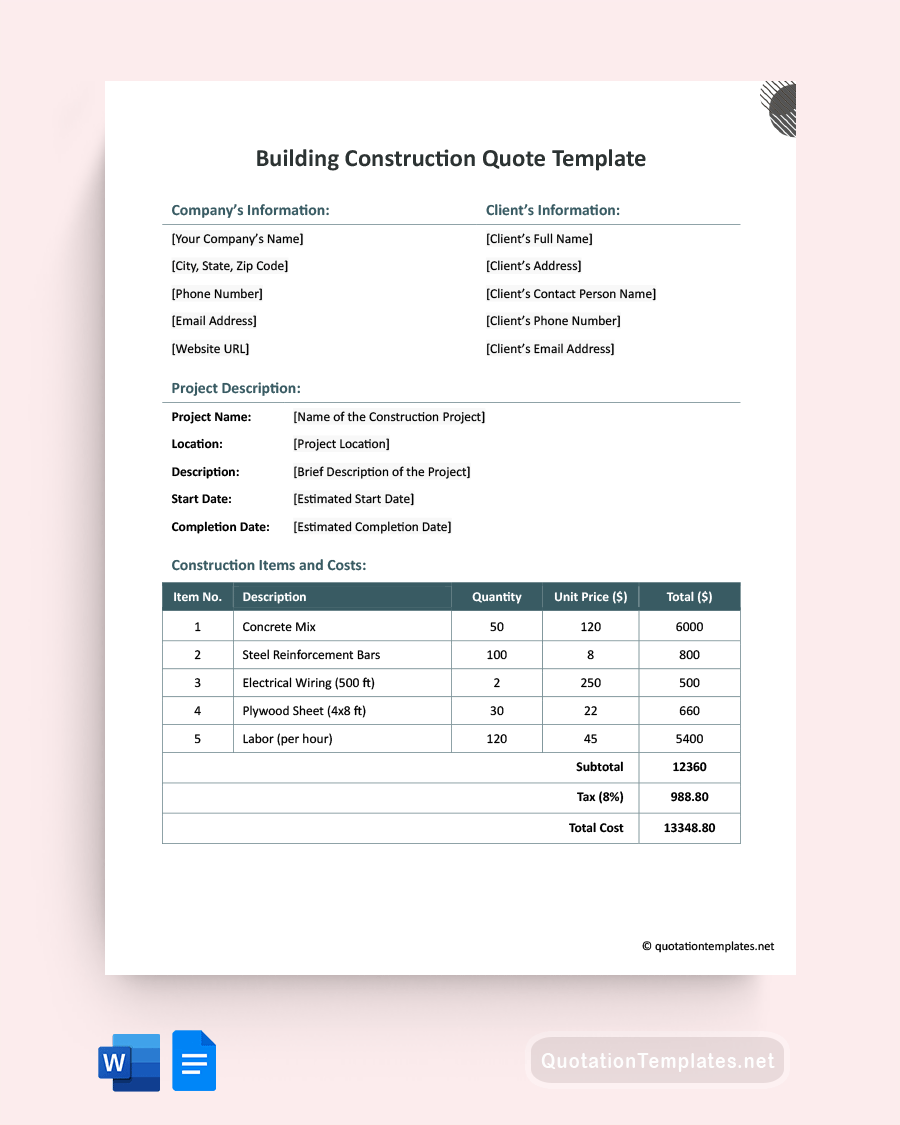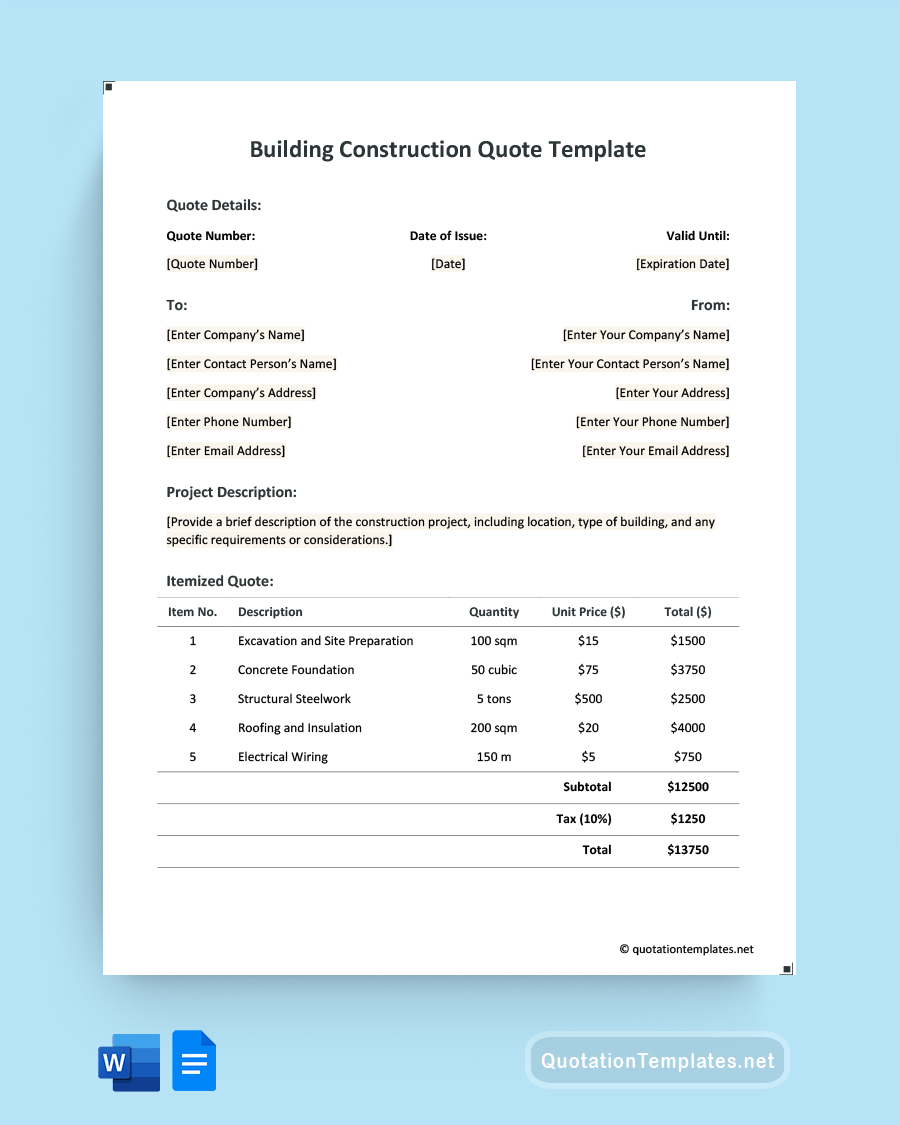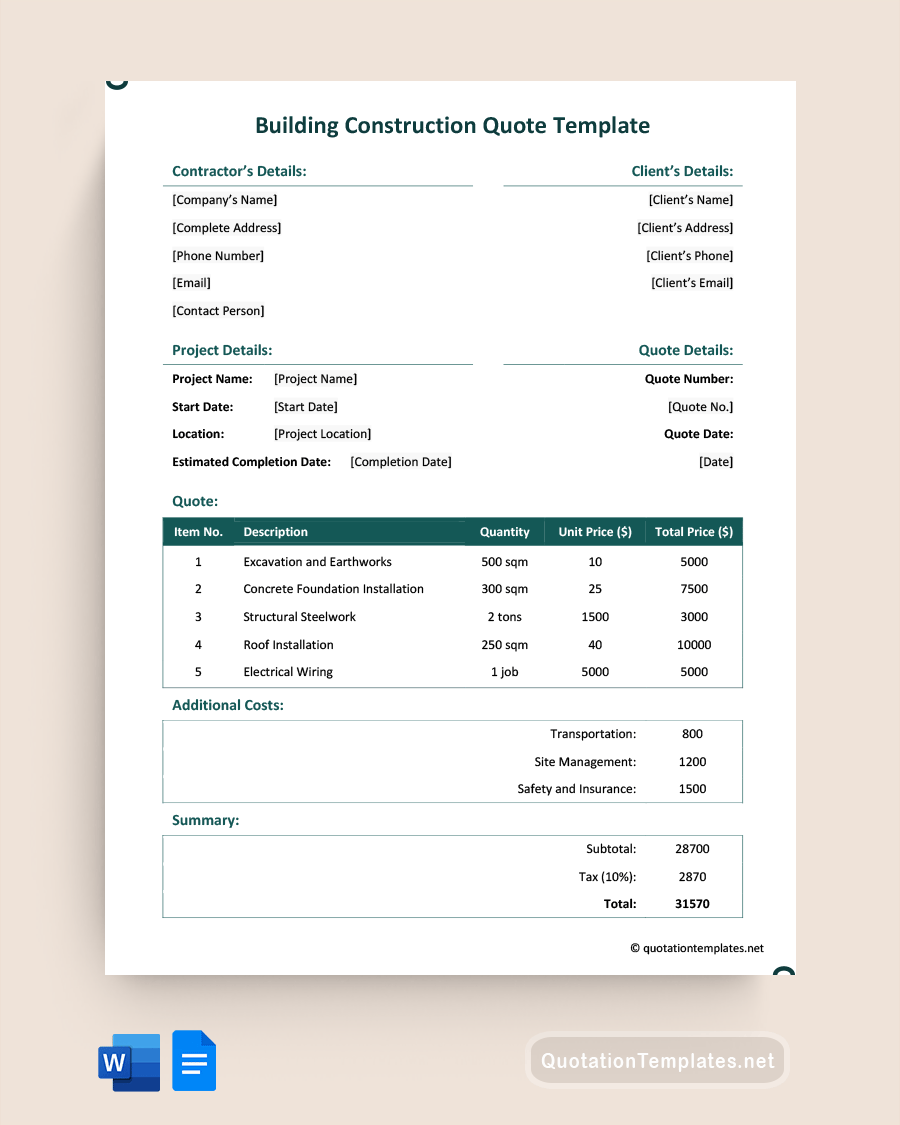Construction Quote Templates
Preparing quotes for customers for a variety of construction activities is an important task for your company. Get it right, and you have a competitive quote that helps you make a profit without endangering the loss of business. If your quote is too high, many potential clients will select another company with lower prices. Quotes that do not cover all of your costs endanger your company’s ability to survive.
Incorrect quote estimates can jeopardize your company’s reputation, limiting your ability to cover costs and make a profit. Quotes are also a primary method of communicating with your client regarding what work will be completed, by when, and how much it will cost. We will cover all of the details associated with preparing construction quotes and using templates in the following paragraphs.
What is a Construction Quote?
A construction quote must include the cost for all of the material, labor, and miscellaneous expenses required to complete a construction project. Completing a detailed construction quote helps with planning the project, timing of material delivery, number of resources needed and when, and establishing a proposed schedule. Once all of the planning is completed, your company can calculate the total cost for the task and submit it to the client. Overhead costs and profit margins are also included. Many companies prepare small construction quotes by hand; however, larger, more complex projects will use estimating software to help them with the task.
What Is a Construction Quote Template?
Many companies are focused on delivering construction services and products within a narrow scope. The use of construction quote templates in these situations can save a great deal of time. Everything from the company’s contact information to products, labor hours, overhead, and taxes are prepopulated on the template. The estimator simply has to fill in the quantities, and the template generates the detailed quote.
Larger, more complex quotes may use several different templates that are focused on various aspects of the total job. They are amalgamated to form the final quote.
Construction quote templates save time for the company while preparing a quote for a customer. They also ensure consistency in terms of quality and inclusion of all elements of the quote. The danger of missing costs is minimized whenever templates are used. In addition, construction planning and quotes must be completed before the project begins. You may be taking on too large a job with insufficient resources to ensure completion and profit.
Essential Elements of a Construction Quote Template
Project scope – an agreement between the client and the construction company is extremely important. Understanding your client’s expectations, the complexity, the final design, and the objective of the project once completed must be well understood. What are the legal issues or regulatory concerns that must be met? The location of the construction may add costs if there is a great deal of travel involved. Are there special conditions required for the project that must be included?
While it is extremely important to define and agree on the scope of the project, it is also important to define what elements are outside the scope. Scope creep occurs when additional work is added to a project that is not planned or budgeted for and can jeopardize the success of the project in terms of cost overruns and missed completion dates.
Design – detailed cost estimation can only be completed once a design is finalized, reviewed with the client, and agreed to by all parties. Details regarding materials and labor can be estimated based on the final design. Any additions or changes must be managed as change orders from the initial construction quote.
Estimating – is often completed by a dedicated team experienced in the quote process. They include quantities of materials, labor, direct and indirect costs, along with applicable taxes and profit margins.
Quotes must be competitive and thorough while ensuring a profit margin. If your quotes are consistently high, it could mean you may not acquire many contracts. Your competition may be undercutting your bid to gain business. They may also be doing a poor job of estimating, which will lead to unsatisfied clients and poor profit margins.
Preparing quotes, especially detailed, time-consuming quotes, take a great deal of time, and there are costs for labor to prepare the quote that must be absorbed by your company. Not all bids are accepted. If your run a quote department or spend your own time preparing quotes, the overhead costs must be considered and included in all quotes to recover the cost of preparing estimates while remaining competitive.
The Construction Costs to Include
All of the costs for a project must be included. There are the direct costs for materials, equipment rentals, the equipment you own, and labor which must be included. In addition, several indirect costs are a little more difficult to determine. These are costs for your office, rent, utilities, taxes, and maintenance, as well as benefits. Let’s examine these costs in a little more detail.
- Labor
- List of materials
- Prices for materials
- Cost of equipment
- Overhead costs
Labor – costs can be a huge cost, sometimes as much as 50% of the total job, depending on the type of work completed by your company. Estimating the number of hours that will be needed, delays caused by late material deliveries, and weather can add significantly to the total cost. Scheduling is also important in terms of the start and end dates, but also the type of skilled labor needed at various points in the schedule. Skilled labor rates vary depending on the trades involved.
A list of materials – must be developed to complete the project. Assemble a complete list of all materials that will be needed along with the quantity of each item. Every job will be different, and the type of construction each vendor provides is different. Make sure you have a complete list of everything needed for the construction activity.
Prices for materials – once you have the list of materials, each item can be priced to determine the total cost of materials. Don’t forget delivery costs, inflation if the start date is a ways off and whether you can negotiate quantity discounts. You may also want to include an allowance for damage to some materials on site, which can occur even on the best-managed work site.
Cost of equipment – that will be required on site either as a rental or units owned by your company. Estimate the number of hours the equipment will be used, including transportation, and multiply by the rental rate or the loaded rate you have established for your equipment. Don’t forget the cost of running the equipment, transferring it to the job site, and any security costs if it is going to be left on the job site.
Overhead costs – can get out of control unless you maintain a careful watch on these expenses. They can include everything from the cost of the estimator, the cost of buildings used for offices and storage, taxes, benefits, license fees, and more, depending on your business. Keep these costs as low as possible and attach an hourly rate to the cost of labor and equipment. No client wants to see a line item on the quote for overhead costs, ever.
What Are the Different Types of Construction Quotes?
The most common type is the quote to a client stating the work to be completed and the total cost along with any major assumptions, exclusions, and start and end date. However, other types may require more effort, and the sales cycle may also be much longer.
Feasibility Quote – assess the size of the job and scope and whether it is the type of work that fits your company’s expertise. If it is not a good fit and may cost too much to follow through on, this is the time to withdraw from the bidding process.
Intermediate Quote – further evaluation of the job, refining the numbers based on experience with this type of work, including specific challenges that may be associated with this job.
Preliminary Quote – an initial design is completed and reviewed with the client. The estimate can be firmed up based on the initial design work, recognizing that the customer may make further changes.
Pre-Final Quote – based on detailed design work and requirements by the customer, including material, equipment, and labor estimates. Changes can still be made to the design, material substitutions made, etc.
Final Quote – based on a signed contract, no further changes are allowed unless managed through a change order process. It should be the most accurate of all of the quotes and will be referenced in the final contract. Work begins based on the final design and the final quote of material, labor, and equipment.
Key Points
Most construction quotes use templates to speed up the process and improve the accuracy of the quote. Changes can be made easily to quantities, and line items can be added with a corresponding updated summary of the impact of the changes. Even small quotes for contractors operating as sole proprietors benefit from using construction quote templates.
Always prepare a written quote to review with your client. This is the opportunity to review assumptions and update them accordingly, which could impact whether your company is selected to complete the work.
Keep track of overhead costs. They are real and can have a significant impact on your company’s bottom line. Factor overhead costs into the hourly cost for labor and hourly rentals for equipment. Never identify overhead costs as a separate line item on your quote. Clients do not appreciate these additional costs.
Using a standard construction quote template not only saves preparation time but also improves the accuracy of your quote. Keep unit costs up to date. Add quantities of each line item for labor, equipment, and materials. With a list to choose from, there will be less chance of missing costs that should be included.
Always review any additional city tax, environmental fees, disposal fees, and other fees specific to your business and the location where the work is to be completed.
Developing a detailed quote also assists in managing scope creep, which adds cost and reduces profit margins.
